#and how andrew likes to pull a bait and switch
Explore tagged Tumblr posts
Text
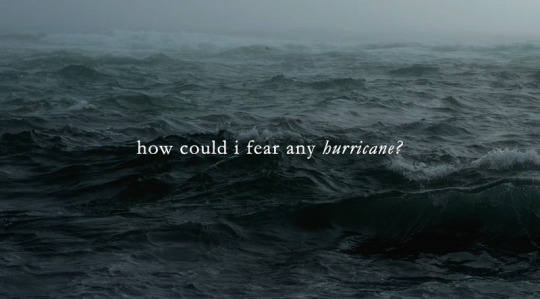

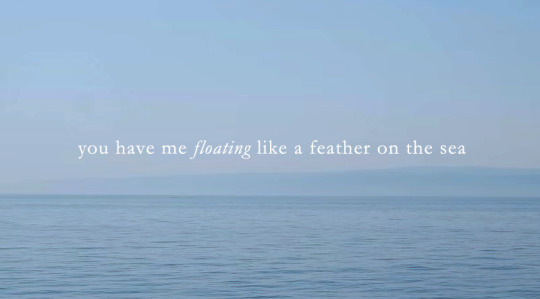


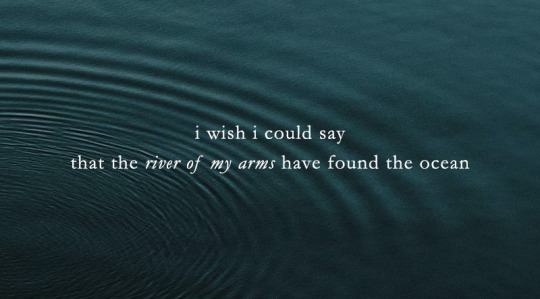
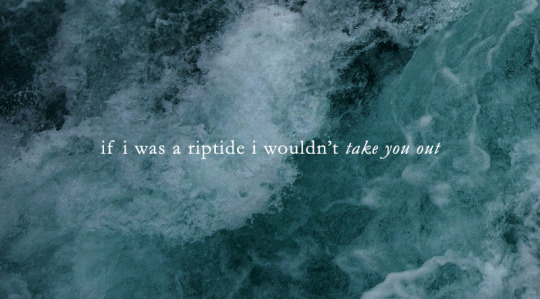
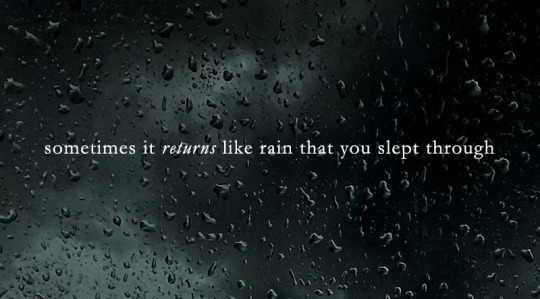
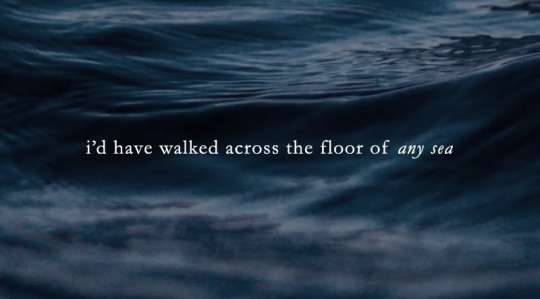

I'd lower the world in a flood / Or better yet I'd cause a drought.
#it sounds like maybe there was some interest in an exploration of water references in unreal unearth#and how andrew likes to pull a bait and switch#between the album's visual imagery and its lyrical imagery#just like he did with wasteland baby actually being a very fire-centric album#and how we see elements as cleansing and renewing and cyclical forces in his music#so this was fun to think about#with bonus through me (the flood) content#because i still feel like it's canonically part of the album#hozier#unreal unearth#lyrics#francesca#first time#eat your young#i carrion (icarian)#who we are#anything but#abstract (psychopomp)#unknown / nth
199 notes
·
View notes
Text
I like how in the scene after Andrew goes to Easthaven and Neil is trying to get Aaron to understand why Andrew killed Tilda by pulling that bait and switch, when Aaron denies it Neil just goes "he told me he did. I didnt even have to ask him." Which is just so funny to me bc it implies (at least to Aaron) that Andrew just,,,willingly offers this information up unprovoked like Neil didn't have to ask, Andrew just told him could've had nothing to do with the conversation for all Aaron knows
#idk why this is so funny to me but it is#it also plants the seeds in Aaron's brain that oh maybe Andrew is at least attracted to Neil#but no#Neil was such a little bastard#i mean#it was the only way Aaron was gonna understand#but jesus fucking christ#Neil boo this is why people want to kill you#aftg#neil josten#andrew minyard#all for the game#andreil#the kings men#tkm#aaron minyard#the raven king#trk
141 notes
·
View notes
Text
(Warnings: child abuse implied)
(Spoilers: "Whiplash" film, 2014, JK Simmons)
There are probably a lot of characters who have a similar demeanor to Jotaro, but the only character so far who actually reminds me of him is Andrew from "Whiplash."
I've already had headcanons about Jotaro's dad being abusive without Holly knowing about it, but watching Whiplash kind of made me overthink it and wonder if it's even possible to be more than just something I made up. After all, the JJBA series is no stranger to abusive parents.
The main ways Jotaro fights in SDC is by pulling a bait-and-switch and mentally knocking the wind out of everyone, but only when things have gotten so desperate that pulling that and humiliating his opponent is the only suitable punishment for what they did to him or to his friends. He is a master of vengeance.
But, nobody starts out that way. Nobody is born with the ability to expertly plough themselves out of a corner. You'd have to have been in situations where it's the only option.
That makes me wonder more about Jotaro's father, and makes me think he's probably a lot worse than just a dad who's almost never home. Particularly since, in the parts of SDC when Jotaro does take a hit, he responds to it like it's nothing new. Even Steely Dan's actions seem like it's maybe not his first rodeo.
In "Whiplash," Andrew doesn't truly fight back until he's been pushed beyond the breaking point by his antagonizing father-figure jazz musician. And when he does fight back, much like Jotaro, he pulls a bait-and-switch, aiming to humiliate and demolish. With his actions alone, he says, "How dare you fucking do that to me."
We can see from Holly's memories at the beginning of SDC that Jotaro did not start out bitter and sarcastic. Much like Andrew in Whiplash, he started out as a bright-eyed kid who didn't want to cause any problems.
What's worse is, it seems clear from Holly's genuine compassion that whatever cruel side there is to Sadao, she doesn't know a thing about it. No matter what the cost, no matter if Sadao is the breadwinner in the family, she would not let Sadao anywhere near Jotaro if Sadao had ever done the slightest cruel thing to him.
If Sadao were abusive, Jotaro would be trapped, unless he fought back in clever enough ways to make sure Holly never found out.
I don't think Jotaro would want Holly to know about it, if Sadao were abusing him. Protecting his mother includes protecting her happiness.
16 notes
·
View notes
Text
thoughts about bioshock, episode 5
episode 1 / episode 2 / episode 3 / episode 4
jumping ahead a bit because i’ve barely kept up with things BUT
actually, knowing that atlas is fontaine still kinda? made me underestimate him even more?? atlas is positioned so much as the underdog, the poor sod fighting against ryan (“and then ryan pulls the rug out from under you!”) and along with his (intentionally) badly done irish accent, and KNOWING that he’s lying to me about his poor moira and his wee patrick… dealing with fontaine after that actually caught me off guard
atlas is so good at making you believe that he’s a wee bit useless that the bait and switch STILL works even though i knew it was coming. perhaps because i myself hadn’t played this far before, and i hadn’t witnessed the true extent of the con fontaine was playing there with my own eyes and ears, but it WORKED
finding the audiograph of diane mcclintock stumbling in on fontaine as he’s recording something himself – then hearing him switch to a bumbling, friendly atlas, before abruptly switching back to fontaine when, most likely, he sees on mcclintock’s face that she’s realised who he really is. and that’s all the nails her coffin needed
i shaded diane a few times for how she was angry at the protestors mainly for ruining her chances of getting back with ryan, but man, she deserved better. being exploited by ryan, by steinman, devastated by ryan’s callous rejection, only to attach herself to atlas – who, i bet, was only too happy to use her for what information she still had about ryan’s operations
there’s still complicity in her, but she is one of the few characters of whom we have firsthand testimony; how their eyes were opened to what ryan really is. bill mcdonagh is another. he, too, loved andrew ryan. he loved rapture. he trusted in the man and in the idea, and to find him dangling from that meat hook like only so much offal was rough.
5 notes
·
View notes
Note
We all know that the Gothel twist was terrible and was only there for the sake of having a twist, but if it absolutely have been done, how should it had happened to make it better narratively?
so. i spent a lot of time kind of mulling over and autopsying s3 and my personal conclusion about what went wrong is that tts hamstrung itself with poor narrative structure. and this is going to be one of those posts where i lead with definitions of the terminology i’m going to use, for the sake of clarity and to avoid any misunderstanding.
to whit:
story is the sum total of every element of a narrative: character, plot, setting, theme, and structure.
character is, of course, the people in the story. it’s “who?”
plot is the events that happen in a story. it’s “what?”
setting is the time and place of the story. it’s “where?” and “when?”
theme is what the story is *about.* it’s “why?”
and then there’s narrative structure, which i think is a little harder to grasp because it’s much more invisible than the other things. but it’s the framework of the story, or the scaffolding. it’s “how?” — how are the characters rendered? how is the setting created? how are the events of the plot strung together along the throughline? how is the story built?
now… in my opinion, character is the single most important element of a story; compelling characters can salvage an otherwise mediocre story, and nothing kills a story faster than uninteresting characters.
but the one thing good characters can’t ultimately compensate for is poor structure. if the construction is shoddy, so to speak, sooner or later, the roof is gonna leak. right? and we can see this happen in tts: s1 and s2 are solid, and then bam! we hit s3 and it’s a mess of bizarre pacing and dropped characters, the feelings and motivations of key players get all wonky, the plot loses focus, and things increasingly feel like they’re happening by authorial fiat. the weak structure of the narrative has failed, and it dragged the entire story down with it.
and we can look back in retrospect and see that, yeah, all of these problems existed before; tts always had odd pacing, always had an issue with maintenance of the supporting cast, always relied more on convenience than a narrative really should. but these things didn’t hit a critical mass until s3.
so what does this have to do with gothel? well,
in and of itself, “gothel is cassandra’s mother!” is not a terrible plot twist. the problem with it is a problem of execution, which is to say, the flaw is in the structure, not the plot.
#1: set-up
plot twists are kind of difficult to pull off well, because you don’t want to blindside people, but you also don’t want to tip your hand too soon. you want to surprise, or maybe even shock—but you don’t want your audience to go, “wait, WHAT? that makes no sense!”
do you remember the whole “ricky’s quest” thing that went on in s2? we were told that there was an important piece of foreshadowing somewhere in s1 or s2 that no one had picked up on yet and there was this whole thing of people trying to figure out what it was, and then… rapunzel’s return aired, and ricky revealed that the answer was “cassandra briefly glances into the shattered mirror in rapunzel’s tower.”
and that, + the fact that we know cass is adopted and doesn’t remember her birth parents, + vague visual similarities, is the entirety of the s1-s2 foreshadowing for cassandra being gothel’s daughter.
which isn’t nothing, i’ll grant you, but for something as major as the gothel twist, for something that profoundly changes the worldview and motivations of one of the main characters to such a degree that she completely changes sides because of it, it might as well be nothing.
gothel is afforded zero narrative importance in s1-s2. rapunzel has one nightmare about her, and some lingering trauma connected to the tower that is explored, and of course tromus briefly uses her image to try to control rapunzel in rapunzeltopia. but gothel herself is a non-entity until she abruptly and without warning becomes the emotional lynchpin of the entire conflict in s3. that’s jarring.
cassandra is a complex character whose apparent motivations for turning against rapunzel are meticulously built up over the course of s2… only for s3 to pull a bait-and-switch, sweep all of that set-up under the rug, and replace it with cassandra’s messed up feelings about gothel’s abandonment. even her ruined hand never gets mentioned again—not by her, not by zhan tiri, not by rapunzel, not by anyone. that’s jarring, too.
to use my own work as a point of comparison here, the bitter snow equivalent of the gothel reveal is cassandra finding out that sirin is her aunt and her parents were innocent. like the gothel twist, learning that information profoundly changes how cassandra sees herself and the world, and it’s intended to be a big shock… but unlike the gothel twist, i did a lot of setting up for it:
1: sirin has real narrative importance in the first half of the story, pre-reveal. the fic opens with her, her involvement with the separatists is established early, etc.
2: pieces of cassandra’s backstory are threaded through the first half of the story. by the time we hit the reveal, it’s been established that cass is saporian, that her parents were executed for treason, that this treason involved selling poisoned crops and causing outbreaks of a deadly sickness.
3: there are many demonstrations of anti-saporian discrimination and prejudice in the first half of the story: the way cass sees herself and the alienation she feels from the rest of corona, past incidents where she was targeted for being saporian, basically every time gilbert opens his mouth, what happened to caine’s dad.
4: cassandra discovers evidence of the harsh, unjust nature of the crackdown and realizes that at least some of what she’s been taught about coronan law enforcement and recent history is inaccurate… thus planting the seed, for the readers if not for cass herself, that other things might be false too.
5: caine points out that cass is the reason the separatists don’t let parents join up, and though she doesn’t elaborate on that, it’s because cass is proof that corona will steal saporian children if their parents are accused of treason.
and 6: everything sirin says to cass in chapter 14 is wrapped up in her being painfully, painfully aware that a) cass is her niece and b) probably doesn’t know the whole story—while also trying to stick to the plan. so… while she doesn’t spill the beans there, she knows who cass is, she stops andrew from hurting her, she makes a point of not acknowledging the legitimacy of cassandra’s adoption, and obliquely suggests that sir peter is a murderer… and while she tries to stop cass from interfering with what they’re doing, she doesn’t hurt her, even though she very much could.
so… in chapter 15, when sirin comes out with “actually, the blight was a natural disaster no one anticipated and saporians got sick and died too, your parents were just scapegoats because corona wanted someone to blame, and oh, by the way, you’re my niece,” it’s a shock but not one that comes entirely out of left field. cassandra’s parents being innocent victims of an overzealous and prejudiced justice system is a logical extension of all the stuff that has already been set up, and sirin being cass’s aunt helps to clarify motivations that were previously opaque (such as: why does sirin despise corona so much, why didn’t she just kill cass, etc).
and because all of this stuff is given so much attention in the first half of the story, the way it snaps cassandra’s worldview in half and causes such a massive reorienting of her goals and loyalties feels natural. because it already mattered a great deal to her, and it related to the doubts she was already experiencing.
which like, that’s the key. setting up a big plot twist isn’t about establishing one basic fact (“cass is adopted”) and tossing in one instance of symbolic foreshadowing (the mirror thing) and nothing else, over the course of two whole seasons of a tv show. it is about priming the audience to be ready to accept the reveal.
how could tts have done this with the gothel reveal? here’s some ideas:
1: give gothel a greater presence in the narrative. the simplest way to do this would be to really lean in to how fucked up rapunzel is because of her. more nightmares, more overt moments where we see rapunzel still being haunted by her memory. alternatively, lean more into the fact that gothel was a disciple of zhan tiri.
2: give cassandra’s adoption, and the question of her birth parents, even a teeny tiny glimmer of interest. specifically, let “dad found me after my parents abandoned me” be the only thing cass knows about her adoption, and let that hurt her. she doesn’t even have to be curious about who her birth parents were—just have that pain of abandonment more present in the first two seasons.
3: imply the captain knows more about cassandra’s origins than he lets on.
4: you know the parallel in RATGT where rapunzel screams at cass the way gothel screamed at rapunzel? more of that. like, how delicious would it be if there were many little instances in s1-s2 of rapunzel lashing out at cass with behaviors she obviously subconsciously learned from gothel, only for s3 to pull the sucker punch of cassandra being gothel’s daughter? like! imagine how that could so EASILY make cassandra recontextualize her entire relationship with rapunzel by linking rapunzel’s toxic behaviors with gothel’s abuse and abandonment in her mind? and then in s3 you can really dig into rapunzel interrogating her own behaviors and struggling to break the cycle of abuse.
5: if gothel being a former disciple of zhan tiri is narratively important, it can go hand-in-hand with zhan tiri and the other disciples more overtly targeting cass, specifically. even if we don’t know why until the reveal.
i’ve seen a couple posts from other folks discussing how to “fix” the gothel twist, and many of them involve cass either knowing from the start or finding out much earlier, but while that could work, i don’t think it’s necessary. it’s all about the set up. it’s all about constructing the story in such a way that the audience goes “OH!” instead of “WHAT?!” when the reveal happens, and the specific timing of the reveal doesn’t really… matter.
#2: execution
surprising absolutely no one, i’m going to talk about zhan tiri now.
based on what chris has said in various interviews, my understanding is this: originally, cass was originally supposed to be a secret antagonist all along and know about her parentage right out of the gate. her characterization softened early on in the process, her knowing about gothel got dropped, and suddenly the creators needed a way for her to learn that gothel was her mom, and thus zhan tiri entered the narrative.
she is a plot device whose whole purpose is to tell cass “gothel was your mom and abandoned you for rapunzel,” and then fuel her downward spiral. the rest of her character exists in service of that, full stop.
which… like the gothel reveal, having a character whose primary function is to be a plot device isn’t a problem in and of itself. however. “ancient evil demonic sorceress with deep ties to the magical lore of the setting and an entrenched hatred for team hero, whose MO is manipulating people” is a terrible character archetype to use as this kind of plot device, because that kind of character needs to have an agenda in order to function, and as soon as you give them an agenda they develop a gravitational pull on the rest of the story, especially if they’re directly involved with a main character.
and if you’re willing to roll with that gravitational pull, it can be fine. but if you’re not… you get tts s3.
chris has pretty much spelled this out in interviews. he said at one point that they debated multiple potential motives for zhan tiri… but found that anything more complex than “wants the drops and to burn corona to the ground, because reasons” sucked oxygen away from the cass vs raps conflict and eventual reconciliation, which… yeah. so they gave zhan tiri the cardboard motives and didn’t really do anything with her other than trotting her out to give cass a good shove in whatever direction the plot needed cass to fall in every so often.
that zhan tiri is a compelling character in s3 at all is a testament to the strength of her VA and the sheer potential of her established lore, in combination with the fact that she and cassandra are off screen enough to demand that the audience fill in a lot of gaps. but in, like, the actual text, she has all the complex personality of a piece of damp tissue paper and she is, for all intents and purposes, literally just Cassandra’s Brain. every decision, every single decision cass makes in s3 is because of zhan tiri. why take the moonstone? zhan tiri tells her to. why is she so mad at rapunzel? zhan tiri made her that way. why does she attack rapunzel? zhan tiri convinced her she had to. why does she go to gothel’s cabin in TOTS? zhan tiri tipped her off that rapunzel would be there. why does her fragile truce with rapunzel fall apart at the end of TOTS? zhan tiri interfered. why does she try to reconcile again in OAH? she found out zhan tiri was… zhan tiri. why does that reconciliation fail? zhan tiri. why does cass ultimately redeem herself? because zhan tiri stabs her in the back first.
*deep breath*
this is what happens when you troubleshoot a broken narrative with plot devices instead of opening it up to fix whatever is wrong with the underlying structure. in this case, cassandra not knowing about gothel from the get go broke her planned villain arc… and the creators applied zhan tiri like a bandaid, molding this new character into someone who could railroad cass down the preexisting plan for her villain arc.
what needed to happen instead was a wholesale reexamination and reconfiguration of cassandra’s villain arc, her reasons for going down that path, and her reasons for coming back. even if finding out the truth about gothel was still the trigger for it, it’s ultimately not about gothel anymore. gothel is just the last straw.
and in order to work with the characters as-established in s1-s2, the events of s3 would need to be framed that way. if, after all the shit she goes through in s2, cass met zhan tiri, learned that gothel was her mom and abandoned her for rapunzel, and finally just snapped and went after the moonstone because fuck this, fuck you, and then zhan tiri came in with the compassion and emotional validation and the “your mother treated you as a servant and then discarded you for something she thought was better, and so did rapunzel, didn’t she? but i see you, i believe in you, i am your friend, and we can help each other,” and cass bought that because she’s desperate for emotional support and kindness and fuck it, she’s on team demon now, only for her conscience to eat away at her until she couldn’t take it anymore and broke away from zhan tiri for good… then it works, full stop.
like, you don’t have to change a single plot event for the gothel twist to work. you just have to string those plot events along an emotional throughline that makes sense and feels connected to what happened in s1-s2. you can’t use zhan tiri to graft the s3 arc of evil-all-along proto-cass onto canon s1-s2 and call it a day because that doesn’t work! you have to write for the characters you have, not their early planning-stages iterations. if you make a decision early on that breaks your original plan, you have to commit to redoing the whole plan.
and if you do that, if you fix the underlying structure, you don’t need a character whose sole purpose is to railroad another character down a predetermined path that no longer fits her characterization; cass and zhan tiri can instead both be characters, acting according to their motivations and goals, and not puppets pantomiming the ghost of a broken plan.
(you do still have to accept that zhan tiri will pull focus away from the cass+rapunzel friendship, though. them’s the breaks. don’t use zhan tiris if you’re not willing to let them gobble up the spotlight a bit.)
TL;DR: to fix the gothel twist, set it up better in s1-s2 by making the question of cassandra’s parentage, or abandonment by her parentage, important to the narrative at all, or else by focusing more closely on gothel being a disciple of zhan tiri; then execute the s3 villain arc in a way that makes sense for canon cass and what she experiences in s1-s2, rather than using zhan tiri to railroad her down the path evil-all-along proto-cass was supposed to take.
the problem is a structural one so at the end of the day the solution is to fix the structure. ¯\_(ツ)_/¯
111 notes
·
View notes
Text
Tangled Salt Marathon - Max and Eugene in Peril on the High Seas
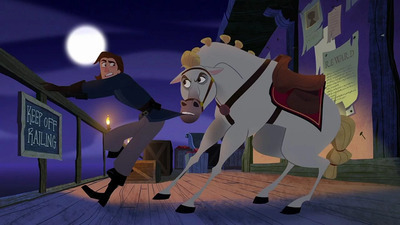
So we have another obligatory animal focused episode. This one fairs much better than Max’s Enemy and King Pascal; but it’s still ultimately useless filler.
Summary: Rapunzel and the group are finally leaving Tirapai Island when the cargo ferry arrives, but Eugene and Maximus get into an argument, resulting in them falling overboard. They manage to save themselves on a passing ship, but discover it to be a prison ship where all the criminals, including the Stabbington Brothers, Lady Caine and Axel have escaped and taken control. Eugene and Maximus attempt to escape, but discover the villains' plot to ambush the cargo ferry and set out to stop them. Meanwhile, Rapunzel and the group discover Eugene and Maximus are missing and set out to rescue them.
There’s No Ticking Clock In Season Two and That’s to the Series’s Detriment
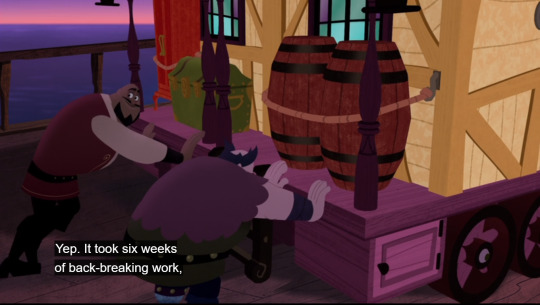
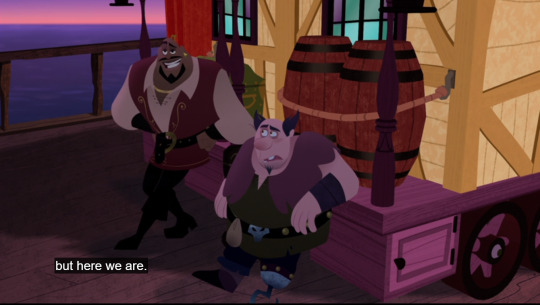
So we’re finally leaving the island and this bit of dialogue tells us that they were on said island for at least six weeks. Which matters not in the slightest in the grand scheme of things; which is the problem.
In addition to there being no outside threat forcing Rapunzel on this journey, there’s also nothing that’s forcing her to hurry up. So we’re doubly lacking in tension. There are no stakes in season two so things feel over long, and arcs that have the heroes stay in one place for more than two episodes at time stop the momentum of the series dead; leading to tedium for the viewers.
We Didn’t Need King Pascal Just to Set Up the Firefly
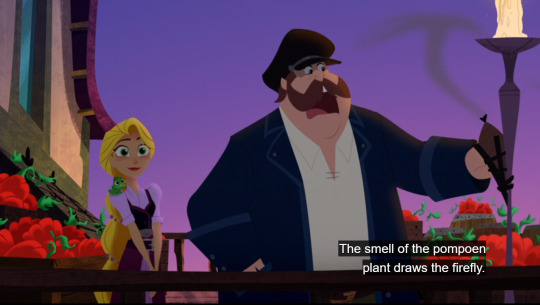
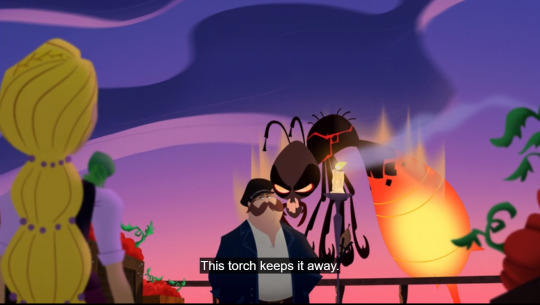
The firefly is one of the few elements in the show that has proper set up and resolve. It’s established as the threat in one episode and then used as the solution in this episode. However both episodes are utterly useless in the over all arc so, while clever, it’s a wasted idea. It’s also unneeded since this intro exposition re-explains what the firefly is and what it’s deal is in case people missed out on King Pascal anyways.
The Reason Why this Max Focus Episode Works, but Not Max’s Enemy, is Because It’s a Double Act
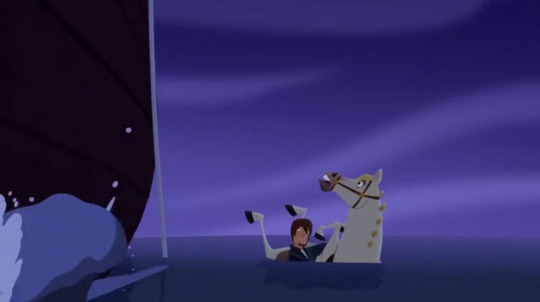
The problem with the mandated animal themed episodes every season is that Max and Pascal aren’t strong enough characters to work by themselves. They’re sidekicks; they’re designed to play off other characters. The writers seemed to clue in on this by making this episode and Max’s episode in season three, team up episodes. So now today’s episode becomes a Eugene focused episode too. Which in turn allows for their character dynamic to be fleshed out more.
We needed more interesting combinations of the mains in episodes like this one in order for the group to feel like a group. We also desperately needed to do something similar for Pascal instead of just rehashing the same plot for him over and over again.
This Plot Point Makes No Sense
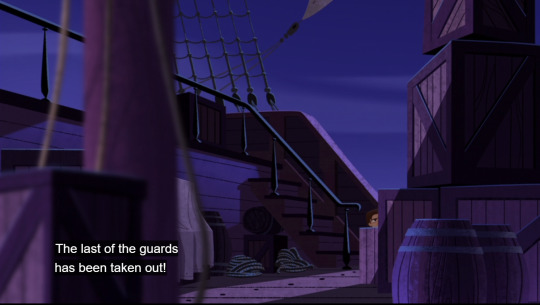
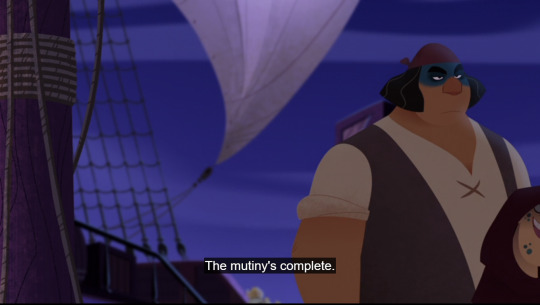
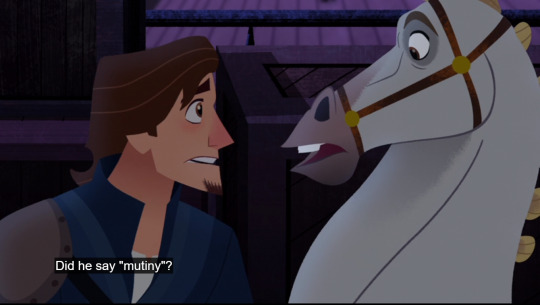
When I first saw this episode, I thought it was foreshadowing later developments for season three, seeing how it’s one of the few episodes in season two that connects back to season one. However, once you know the events of season three, this episode no longer makes logical sense within the greater narrative.
For you see, Andrew and Varian have teamed up to take over Corona at the beginning of season three. Yet that begs the question of why didn’t Frederic ship them away on the prison barge as well. Varian you might could excuse being missing here given his age, but Andrew? There’s no reason to keep Andrew around; none that is given on screen anyways.
Also this mutiny couldn’t have taken place after the Saporian take over either. For starters all the guards retreated from Corona entirely when it became evident that the Saporians were in charge. That’s a stated plot point in Rapunzel’s Return to explain why Cap is missing. There wouldn’t have been a need for a mutiny if Andrew just let all the criminals go and there’d be no reason why Andrew would send them away using his own guards. The Saporians are small in numbers and that would be a waste of manpower.
Also, because the Saporians are outnumbered, it doesn’t make sense to send away potential allies. Lady Caine has more logical motivation to join Andrew in his take over than Varian does. She just wants revenge on Frederic and riches. She cares nothing about ruling a kingdom and holds no qualms about hurting others; so she’d be the perfect partner for Andrew’s plans. Add in the fact that she has a whole gang/small army of criminals under her command, and she could have brought along some much needed manpower.
Lady Caine is Wasted!!!
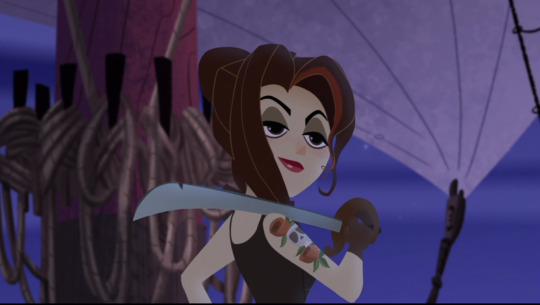
Speaking of Lady Caine, this is her final appearance in the show. Introduced in the pilot as an important character, yet given only three episodes and shoved out of the picture before the final season. And they didn’t even bother to bring up her original motivations or goals in any of her return appearances.
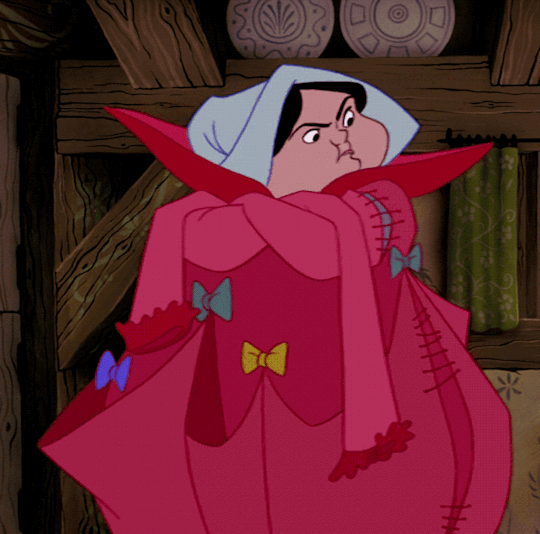
Chris mentioned in interviews about how he wanted to ‘defy audience perception’ and so pulled a bunch of bait and switches in the writing; but this isn’t that. This is just straight up lazy writing. There’s nothing clever about introducing a character as being important and then not using them. It’s a frustrating waste of time and a waste of a concept; not a surprising ‘gotcha’ for the audience.
Proper set up and resolve exists in storytelling in order to get your audience invested in what is happening and then give them a satisfying pay out for their continued involvement. Modern television writers have gotten so caught up in ‘shocking’ twists that they forgot the importance of giving satisfying endings to their audience. Because if the audience isn’t satisfied they will walk away. Hooks alone are not enough to keep them around as evidenced by the series ratings drop.
Also, Why is Weasel Here?
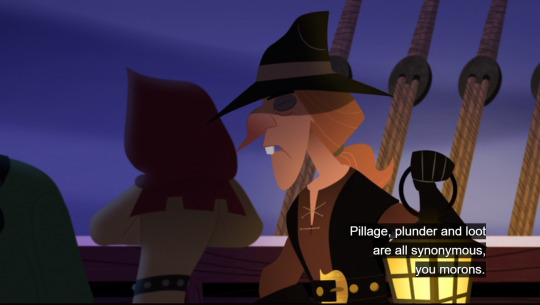
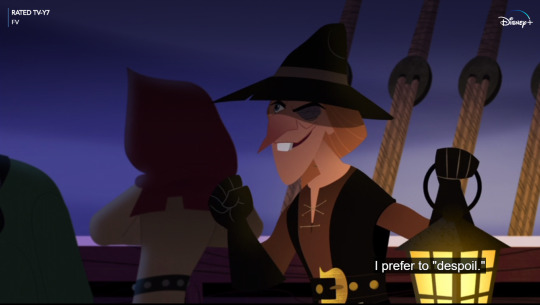
I once suggested that this episode would make more sense if Max’s Enemy came before One Angry Princess in season one. Implying that Caine and the gang were sent away before Andrew’s arrest. This idea flies out the window with Anthony the Weasel here. He was last seen running away at the end of The Return of Quaid. How the hell did he wind up here?
He had to have been arrested, put on trial, and then shipped away with the other criminals in between TRoQ and PotHS. Which just raises a whole bunch of other questions.
How much time has passed between then and now?
What did Weasel do to get caught in Corona?
Why did it take so long to ship Caine and her gang out when it was just a matter of days for Attila to be banished?
Why wasn’t she put on that same barge Attila was going to be put on?
If there was enough time to ship Attila and the Weasel out then there was plenty of time to ship Andrew and Varian, so why are they still in Corona?
Why is there even a prison barge to begin with? Are they just that stripped for room and man power in Corona’s dungeons?
Where does the prison barge actually go to? Does Corona own a prison island or do they have a deal with another kingdom? What is the world building behind this plot point?
Also where the heck did Dwayne go?
You Need Villains
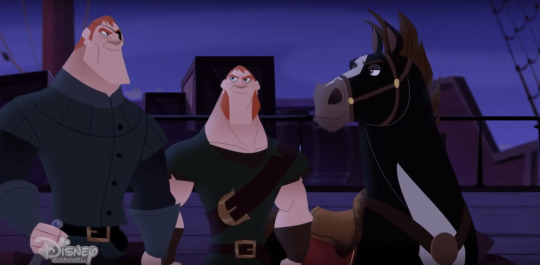
In the end it doesn’t matter. This is just a lame excuse to get rid of all of the season one villians besides the Stabbingtons. Which only stick around because they’re movie originals and need to reappear and be redeemed before the wedding short; otherwise they’d be gone too.
Which is the dumbest idea ever! Season two and even the first half of season three is devoid of any main antagonists so why are we getting rid of anyone who could potentially fulfill that role? Who’s stupid idea was this? What were they smoking? This goes against basic writing 101. There’s no story if there’s no conflict!

Eugene Has a Point
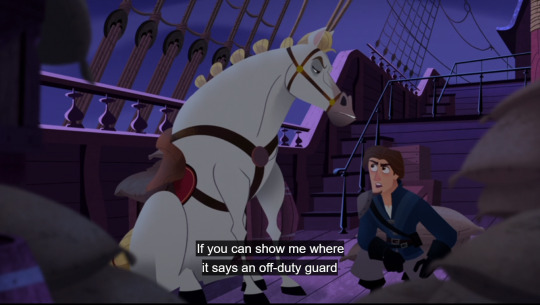
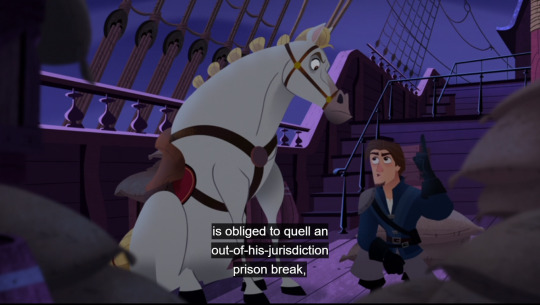
Like there are reasons why law enforcement aren’t on call 24/7 and there are also reasons why different territories have different jurisdictions. Not complying to that undermines law and order, not upholds it.
If a police officer from the US could arrest people while on vacation in Spain, it’d be a political nightmare. Even extrication of wanted criminals who seek refuge in other countries requires permission and cooperation from those countries governments or you’d be violating international law; which potentially could be seen as an act of war.
Also you would still send in people who are actually on duty. Right now there are protests in my country regarding the lack of accountability police officers have. Plenty of cops break the law both on and off duty because they know they can get away with because of the nepotism within the force. Max pulling out a guide book that essentially gives Corona’s guards permission to ‘enact justice as they see fit’ while even off duty is clear case of an abuse of power, and futhers the narrative that Corona is a dictatorship/police state that persecutes it’s most vulnerable citizens.
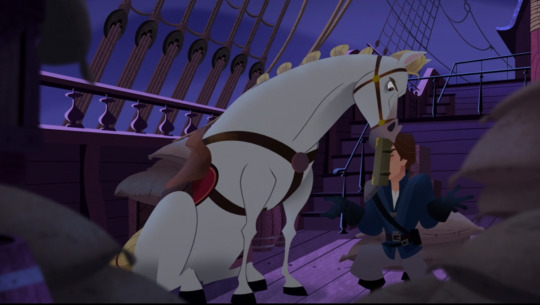
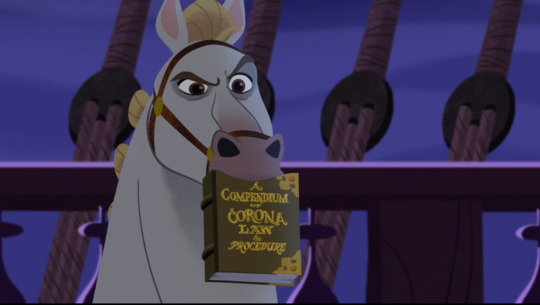
The fact that the narrative then rewards this line of thought by placing Max in the right on this is just another check off in the long list of promoting authoritarian beliefs that this series teaches. People with power are held to different standards then those without. That’s just a fact of life. Having Eugene or Max acknowledge that this does break the law but is still right thing to do would be far better message and give the characters more complexity.
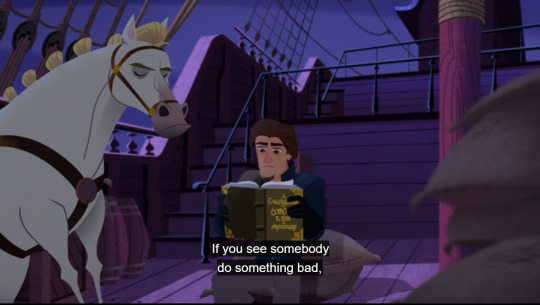
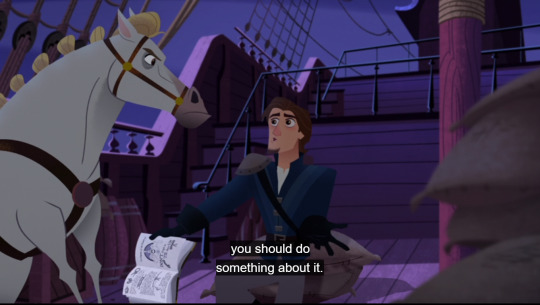
Who gets to decide what is ‘bad’ here? What is this ‘something’ they are meant to do? This rule is a gateway for corruption because it’s not clearly defined and relies too heavily on the idea that guards are naturally ‘honorable’ and good and not, you know, people.
There’s a saying in law school. Nothing is simple and fair. If it’s simple then it’s not fair; and if it's fair then its not simple.
Laws are complex because life is complex, people are complex, and not everything applies the same way because situations are different. That’s why we have courts. And yes, sometimes there’s too much discrepancy in sentences, leading to some people being harshly over punished while others get away with little more than a slap on the hand; but having things the other way around would still cause such discrepancy as not everyone’s experiences are equal to begin with.
And before you say I’m reading too much into a kids show, this is a conflict that the episode itself has decided to introduce. If you wanted a simple message about doing the right thing than ‘the law’ should not have been brought up at all. Because laws are not simple, they are not universal, and they are not infallible. If the writers thought this idea too complex for their audience then they shouldn’t have introduced the idea.
It's better to not bring up deeper subject matter at all than to introduce it and then not address it properly.
Oh, and We Get Confirmation that Corona Speaks English, for Some Reason...
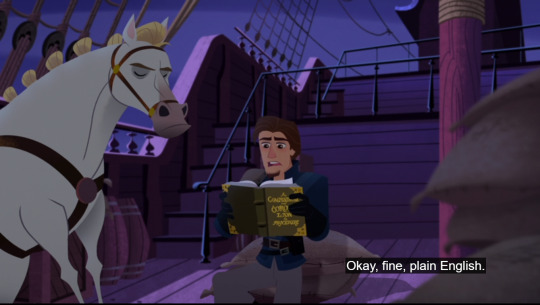
This was also hinted at this in the supplement book, My First Year As A Princess; which was suppose to replica of Rapunzel’s Diary in the show, though it’s sverealy been paired down from the original concept.
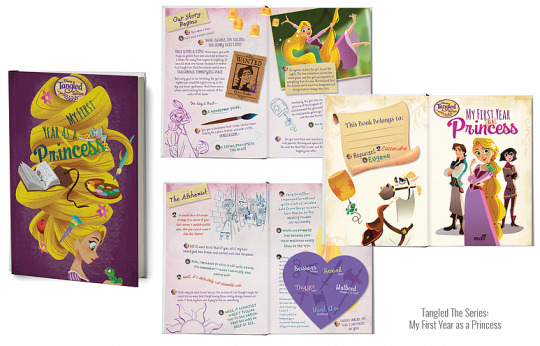
Anyways, it’s pretty much canon that everyone is indeed speaking English on screen, even though there’s no logical reason for this. Chalk it up to yet more lazy world building.
Corona is never hinted to being a replacement for England itself. The few hints we get to it’s placement on the world map suggests it’s on the main continent of Europe and is a peninsula. Other real world languages like, French, Italian, and German are confirmed to exist, with Italy at least being a real location in this world.
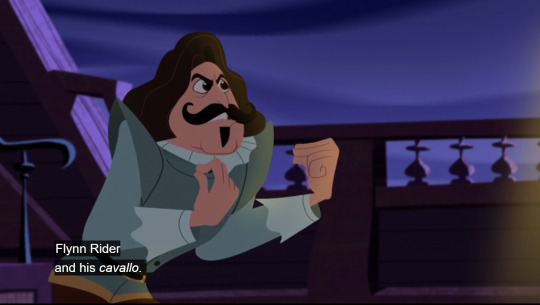
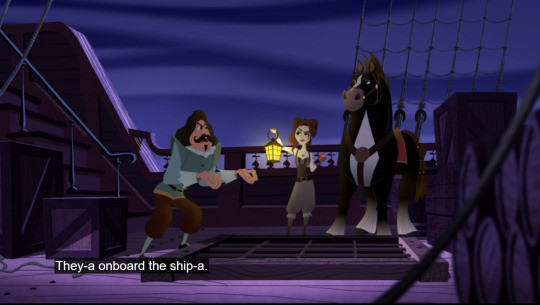
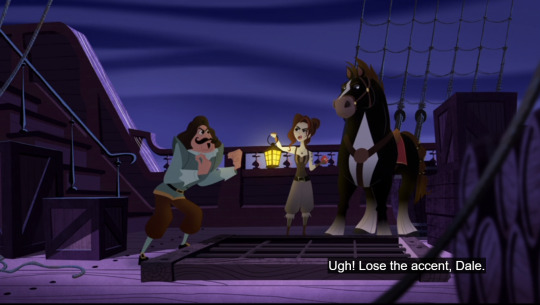
Also we spend this whole season traveling to other kingdoms. So why would everyone speak English? This is before British and American imperialism, and before the internet, so English wouldn’t be a default secondary language for the many countries that it is today. So how does this work?
Once again, if traveling the world is a big plot point of your story then you need to determinate where and how your main protagonist fits into that world. If they’re a princess of a kingdom then we need to know where that kingdom is in relation to the surrounding places we visit or discuss.
Axel is Still Useless
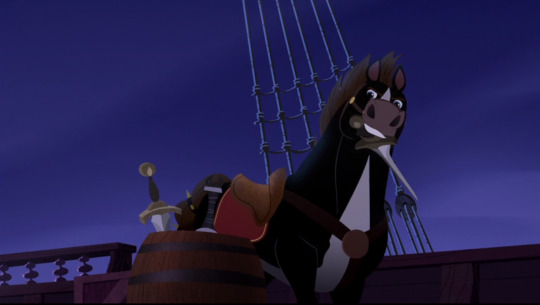
Max didn’t need a rival. This character adds nothing to the over all story and is one villain/character too many in an already overstuffed series. I don’t mind the idea of pairing down some of the minions and other background characters. I just take issue with getting rid of all of the villains. Particularly interesting ones that could have done more, like Weasel or Lady Caine.
The Very Existence of Lady Caine Undermines Both Rapunzel’s and Cassandra’s Arcs
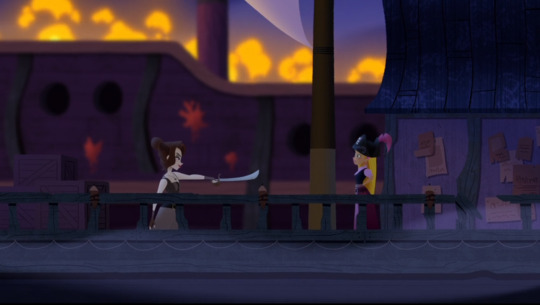
So the series wants to present this idea that Rapunzel is compassionate and is all about giving second chances, yet Caine, one of the most sympathetic villains in the show next to Varian, is given zero chance at all. The show is too busy trying to make Rapunzel look ‘bad ass’ by easily taking down an seemingly equal badass female villain, that doesn’t stop to think about the implications of this conflict.
The series fails because the only people Rapunzel redeems are people that she needs something from. She needs Styalan to gain the Eye of Pincosta. She needs Varian to help defeat the Saporians and ease her bruised ego. She needs Cassandra because she’s her best friend and it hurts her personally for them to no longer be friends. None of the redemptions in the show are actually about the characters who are redeeming themselves, it’s about their effect on Rapunzel’s personal life.
But placing Rapunzel’s personal feelings above what other characters actually need is the opposite of compassion. It’s selfishness. It doesn’t make Rapunzel the focus of the story it just makes her look like an ass.
Moreover Lady Caine’s arc is directly tied to Corona’s corrupt legal system. Rapunzel can’t be this purveyor of change if she and the show never acknowledges why the system must change to begin with.
Last off, Cassandra’s arc is then diminished by the existence of more sympathetic villains like Caine and Varian. They have more reason to do the things they do, and their actions connect back to their goals. Cass doing worst things for less reason, and then getting away with less punishment than them, is a slap in the face to the viewers. It turns her from a likeable character to an unbearable twat, and makes her later redemption a product of nepotism rather than act of agency on her part.
Everyone is ill served by writing Caine out and not giving her a conclusion to her personal conflict. Rapunzel, Cassandra, Frederic, and Lady Caine herself are all denied a chance to grow as characters and that’s infuriating to watch.
Also Yes, This Episode was a Big Missed Opportunity to Add Urgency to the Plot
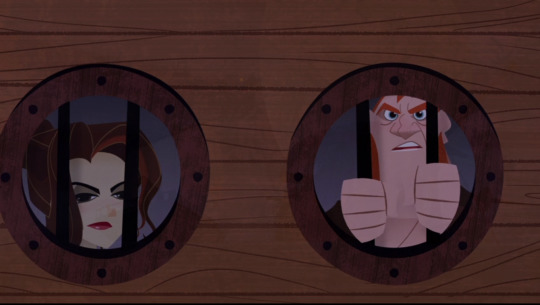
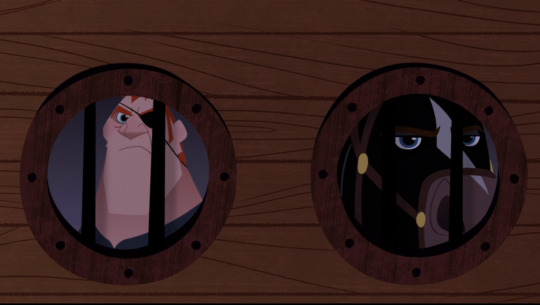
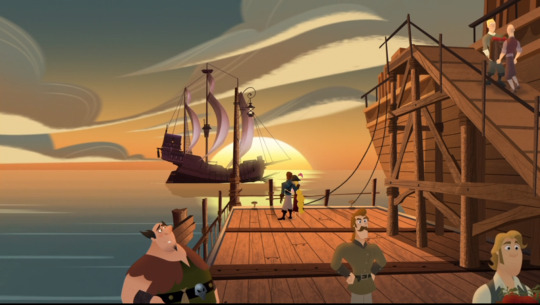
As previously mentioned, season two needed an ongoing external conflict. Anyone of the villains on the ship could have been the main antagonist of the second half of the season. Just have the person in question escape in the confusion, or overthrow the new crew of the ship a second time. Then have them show up later looking for a fight.
My money is on Lady Caine, but the Stabbingtons or Weasel could have done just a well. Caine wants revenge on Rapunzel. The Stabbingtons are after Eugene. Weasel wants power and riches, so capturing the princess and holding her for ransom could have been a goal. Then have them learn about this hidden power then voila you gotta a set up for a race to the end of the quest.
You also could just picked an underling at random and then elevated them to main villain by giving them a good goal and a backstory.
Also finally, Andrew and/or Varian, we’re options that they could have added in here. Varian more so than anybody else as he already has reason to go after the moonstone because his father.
Heck, you still could have added Varian and not made him the villain if you didn’t want to. This could have been the start of his redemption arc instead, and one of the previously mentioned villains,a Brotherhood member, or one of Zhan Tiri’s Disciples could have still served as the main antagonist.
In short, most of the problems with Tangled’s story are really easy fixes and the writers had multiple options at their disposal that they didn’t take. Which is just further evidence to last minute rewrites and Chris and Ben’s missamangment.
Conclusion
I enjoy this episode because it’s one of the few to tie back into season one, but it’s is a missed opportunity and it is a shame that it went nowhere.
#tangled#anti-tangled#lady caine#anti rapunzel#anti cassandra#eugene#max#tangled the series#rapunzel's tangled adventure
69 notes
·
View notes
Text
Perdition’s Flame - Review

So here’s a quick tidbit about me: I really like horror of a specific bent. I’m not a fan of gore really, I find it lacks punch, but creeping dread, unsettling atompsheres, subtle horror is a genre I truly, truly enjoy.
So this is the first of the Warhammer Horror audio dramas I listened to and, personally, I feel like an audio drama is actually a pretty effective way of conveying horror. I’ve often found that any amount of frightening imagery can be handled by simply muting a video, robbing it of impact. But listening to something frightening even with now images often unsettles me.
So how is Perdition’s Flame? Well since these are beginning to get wordy I’m going to use a spoiler bar and write about it below. Further I’ll try to be a bit more systematic in my thoughts since this might help some people choose if they do or do not want it. That being said I don’t pretend to be ranking quality here with this only my personal position on how enjoyable I think it will be and to whom.
Perdition’s Flame: A disgraced Vostroyan Imperial Guardsman huddles, alone and freezing, against a dark storm. Desperate for a chance to redeem himself, he grasps at any hope for peace. But in the Dark Millennium, the Gods offer nothing but horror…
Plot: Perdition’s Flame has a fairly succint and tight plot which works in it’s favour. Largely set upon a single vessel and dealing with a rather small timeframe the story doesn’t really drag or plod or have unneccessary sequences barring the introductory framing device and the concluding framing device, both set some time after the actual events of the story.
The story also largely focuses on just two characters, Officer Brandon and her companion the prisoner Vostroyan Vosk (the protagonist). This tight focuses helps us get to know both characters and invest them to an extent. I often find in short audio dramas it is important to have a small cast as a large cast often simply reduces the characters into very unmemorable individuals.
The short of the story is largely that an assault forces Captain Brandon and Vosk to work together to try to stop a series of supernatural phenomena dooming the prison ship they are on, connected to some mysterious cargo an Inquisitor has brought aboard the vessel. The story actually has a not bad bait-and-switch concerning the actual ‘horror’ with the obvious candidate of Chaos ultimately not being as obvious as it first appears.
So how is the horror then, seeing as this is a horror story? It’s not bad...but I’d stop short of calling it amazing. There is one or two early cases of genuinely pretty unsettling scenes, which I enjoyed, but the story’s ‘horror’ transforms into a more visceral ‘zombie hoard’ style of horror by the halfway point which I just never really find very interesting or frightening. The horror, thus, is mostly contained to the first half after which it’s more just like a monster story with little in the way of dread and more just very instinctive ‘this monster will eat me if I don’t shoot it’ fear.
Whilst the plot is middling to good I must admit the end is just to me flat. I know it’s pretty standard for horror stories to feel the end to finish on a very depressing note but in this story that depressing note seems to undermine the primary theme of the entire story. So for this reason I personally feel the ending doesn’t work and undermines the theme of the story.
Characters: There are really only 3 characters who need to be discussed; Brandon, Vosk and Inquisitor Herrin. Without a doubt, for myself, Brandon shines through as the most engaging characer. A Captain of the Praetorian Guard Astra Militarum Regiment she has the most agency in the story by far, her actions largely being the only proactive ones that drive the plot forwards. The story also, despite introducing her as a hardass, shies away from making her a vindictive brute as many Imperial ‘hardasses’ are portrayed as being. Indeed I greatly enjoyed that she directly questions and defies the authority of the Inquisition when it endangers the lives of everyone onboard the vessel.
(On a seperate note just how casually both Brandon and her superior do question and defy Inquisitor Herrin is...perhaps a little questionable? Considering the aura of menance the Inquisition is normally afforded in 40k the fact that a ship’s Captain seems to have almost no fear mouthing off to an Inquisitor and demanding she jettison her cargo is perhaps a little uncharacteristic.)
Vosk is our protagonist and, if I must be honest, the most exogenous of the characters. He isn’t bad, per say, he just isn’t particularly interesting or well-integrated. For example one would think specifying he was a deserter would be part of the theme of the story or important to it but, in actuality, it really is irrelevant. It isn’t worked in as part of the plot really. Indeed, if anything, the primary theme of the story probably means him being imprisoned for being an atheist, or a heretic, would have worked better. Regardless Vosk isn’t a bad character he’s just a rather dull one. He very much serves ONLY as a vessel for narration and I feel often that if you’re doing an audio drama having a character who’s just there for narration is a waste as the audio drama already provides that.
Inquisitor Herrin then is, I suppose, the closest to an antagonist in the story. There is little given on her beyond her being an Inquisitor of the Ordo Chronos and, well, she is a problem. Unlike Vosk her problem is not that she is uninteresting just...the story makes her come across as an idiot. This is a problem considering she is meant to be an Inquisitor and there is already a small tendency of Inquisitors being reflected as idiots at times in stories. To her credit she doesn’t fall into the common narrative trap of being a bloodthirsty idiot, as many Inquisitors are shown to be, just one with seemingly poor grasp of reality. She is consistently presented with evidence that she, and everyone else, onboard the vessel is about to die...but seems to take no action to stop this? Even hinder some of Brandon and Vosk’s actions and insist that everything will be fine if everyone ‘does their jobs’ even though it is made painfully clear that everyone is dying en masse.
Part of this maybe comes down to a poor job of conveying her meaning at the end. In her final sequence, when her ‘special cargo’ is broken open she babbles a bit about some vague indication that she could have prevented something but...the story doesn’t make clear if she actually means she was about to solve the problem or just refering to a smaller, different issue related to her cargo. Either way it would perhaps have been better to replace her with an Inquisitorial Acolyte delivering the cargo for their Mistress or Master and thus more easily excuse their incompetence.
That, or, considering how ridiculously significant the cargo turns out to be, I have no idea why a random prison ship is being used as a transport and not an Inquisitorial Vessel or a Blackship.
Sound Direction: As always the sound direction and voice acting is great. Grace Andrew’s Brandon is particularly fun but even Vosk’s Vostroyan accent is a delight to hear. There is good use made of ambient noise at quite a few stages in order to help give the story a more grounded feel. The only part where I think this ambient sound becomes a bit silly is a sequence near the end where a laugh track from Brandon seems to play on repeat for a few good minutes and sounds incredibly robotic and unconvincing after the first few times.
I must draw special attention, though, to the use of distorted voice for the ‘horror’ at the end. As much as I feel the ‘horror’ lacks punch at the end the voice given to it is superb and very well-done!
Theme: Despite the name, the reference to fire, the protagonist’s main trait, redemption, damnation, perdition are not really the themes of the story. The primary focus is more on faith, as hope, in a dark situation. Throughout the story the cast are confronted by a ‘dark reality’ they have not encountered before and which now shakes their faith and their hope. Brandon, the character of agency, is defined by her constant working to save them even in the face of hopelessness, whilst for Vosk his primary motivation is an all-consuming desire to escape and run away from the things he’s now seen.
The conclusion, though, is an event which Brandon interprets as a ‘miracle’, evidence that there is hope, via faith, for them, that they are not left in a hopeless situation. Though Vosk does not share her thoughts on this ‘miracle’ he comes to see Brandon as representing that hope for him, stressing his desire to ‘live on’ is purely because he doesn’t want Brandon, who saved him, to have done so in vain. Finding something to believe in, despite a seemingly grim outlook, is the stronger theme to me.
Which is part of why the ending, which basically invalidates this, falls flat in my opinion. It’s one thing to have a cruel twist ending, it’s another to build a theme throughout a story and then just pull it out from under the audience at the end and go ‘silly rabbit hope is for kids!’
Conclusion: Perdition’s Flame is okay. Certainly better than Killshot and the Devil You Know. It is not amazing or incredible but it just manages to coast by enough that though I would not be enthused to listen to it again I would not never do so as with Killshot and Devil You Know. It manages to just about break average or slightly above average. I can’t recommend it as a story I think anyone needs to listen to but I can say that if you are bored give it a try.
#warhammer#warhammer 40k#warhammer 40000#inquisition#astra militarum#imperial guard#vostroyan firstborn#legion of the damned#chaos#lost and the damned#audio drama#review#warhammer horror#black library
11 notes
·
View notes
Text
Answer

PART ONE
a/n sorrryyyyyy for the long wait but hope you guys enjoy and we’ll try to post more regularly since its summer. Anywayyy here’s the first part of Jongdae’s au!1~yoyo y kookie
Acacia is a girl in highschool only trying to readjust herself to her new surroundings, while keeping her brother out of trouble. Everything has been a boring routine till she ends up on the wrong side of town at the wrong time, this is where she first meets Chen, although the circumstances aren’t the best.
Acacia’s POV
“Acacia Wilson. Acacia Wilson to the front office.”
I groan as I hear the all too familiar sound of the principle calling me down to the office. Ever since my family moved to Korea me and my brother have fallen victim to any type of stereotype there is. We were both quiet. Extremely. Neither of us liked to draw attention to ourselves. That’s why I was mortified when our mother told us we were moving to Korea with her boyfriend.
I pack up the book I was reading and slip my bag onto my shoulder before hurrying down to the long hallway towards the office. As soon as I walk into the office I’m greeted by the only person who treated me and my brother with any sort of kindness in school. Lucky for us his name was Principle Lee.
“Acacia how are you?” I give Principle Lee a small smile mumbling something about being tired but good. “Makes sense you’re still top of the class even with the language barrier. I’m quite impressed Mrs.Wilson. If I didn’t know better I’d say it was magic.” I giggle before following Him into his office. “No Principle Lee it’s just a good memory.” That was an understatement. My Eidetic memory was a blessing and a curse. Depends on who you ask. I will never forget anything. Meaning I’ll ace any test I’m given and learn any language, Korean for example. But I will never forget my parents fighting or the taunting from my foreign peers. At least Andrew would be able forget.
Which brings me to the boy sitting right in front of me. “Andrew what did they do to you this time?” All he does is hang his head blood from his busted nose leaking on to the front of his shirt. I shake the tears from my eyes as I move to grab some tissues from Principle Lee’s desk. “A group of girls found him in the courtyard. Of course he still won’t tell me who’s doing this. I couldn’t get a hold of either of your parents. I’m sorry but I didn’t know who else to call.” Principle Lee gives me a sad smile. Pity.
“No it’s ok. Is it ok if I just take Andrew home a little early today?” Principle agrees and escorts us out of the school locking the school gates as we walk out onto the busy Seoul street. “Won’t mom be mad we missed school?” I let out a sigh of relief as soon as I hear Andrews small voice. He just started 6th grade but he was still so tiny.
“Hey I’m the big sister here. Leave all the worrying to me little man.” Andrew gives me a small smile before taking my hand as I lead him towards our house. I swing our arms as I look around. Seoul really was beautiful. As much as I hate my mom for moving us here I couldn’t deny that. I look at my phone to see it was now 3 am and an idea pops into my head. “Andrew what do you say we go on an adventure?” Andrew frantically nods his head causing me to let out a giggle.
“Sounds good little man.”
It was currently ten minutes to midnight and I was carrying a sleepy Andrew in my arms. After getting him cleaned up at home and texting my mom to tell her where we were going I took Andrew on a full tour of downtown Seoul. Two months we’ve lived here and Andrew still hadn’t been to a park. My mom was always too busy with her work. Our step dad too. So I’ve adopted being Andrews much needed mother the past few weeks. A week before we moved here I memorized as many maps of Seoul as I could so that came in handy when giving Andrew the full experience.
“Are we almost home?” I smile when I hear Andrews voice obviously trying to fight off sleep. “Almost little bro just close your eyes and oh how time will fly.” Andrew gives me a tired laugh before snuggling into my neck. I think back to the maps and decide to take a detour through a small neighborhood. It was on the tougher side but it was a quicker less noisy way home.
I tense up a little when we pass a dark alley....something wasn’t right. It wasn’t safe. I don’t know how I know but I just know. As if the world wanted to prove me right I hear a gunshot go off further just behind Andrew and I. I quickly turn around and look wide eyed. Under a light I could make out three figures. One on the ground unmoving the other two standing over the third. I could hear my breathing getting considerably louder as I try not to draw attention to myself and Andrew. They were so close and our house was so far.
“Acacia why did we stop?” My heart stops beating when the two men look straight at us. My body was on high alert now as the two men come towards us a flash of metal flashing as they leave the light of the lamp post. I quickly estimate the time it would take for me and Andrew to make a run towards the house. With both of us running it would take at least 13 minutes and with Andrew half asleep we’d risk him falling behind. But if I could distract them....Andrew could make it in 10.
“Alright little man time to be brave.” I slip Andrew off of my back and speak quickly as with each passing second the two men get closer. “You need to run there’s no time to ask question. You go straight home. Straight home you hear me? Stop for no one-“
“But-“
“Go!”
I cringe as Andrew flinches at my loud voice but he takes off towards the house nonetheless. “I love you!” I yell after him as he rounds the corner back towards downtown Seoul. “Please get home safe.” I whisper as I drop my backpack on the ground and turn around to face the two men.
“Well well well. What do we have here?”
I cringe at the mans icy voice. “Look I don’t want any trouble-“
“You don’t want any trouble? You wouldn’t have been in this part of town if you didn’t want any trouble.” I look around to find any visible exits. If I took the alley to the left I’d find a dead end. If I went the way Andrew did I’d risk leading the pair straight to him.
“Wait doesn’t she look like the bosses daughter?” I could go towards the man...the man. He wasn’t under the street light any more. “Boo.” I let out a loud gasp when the two men in front of me are shot. No no no this can’t be happening. I look down at the two lifeless bodies their faces burning into my brain. Don’t look at him don’t look at him.
I slowly back up closing my eyes trying to forget. Just forget come on. “Hey.” I stumble back when I hear the man's voice. It was sharp and calculated. Nope don’t look at him Acacia. “Shit Jongin what the hell happened we left you for not even two- who’s that?”
Shit there’s another one. “You know Suho isn’t going to like witnesses.” ...another one. Alright Acacia time to get out of here. Without looking at any of them I take off running past the group. I still needed to protect Andrew.
“Shit grab her.” I run as fast as I can down the same dark alley Andrew and I passed early. All I could hear was the sound of footsteps running after me and the feeling of my lungs burning up from the lack of oxygen. I turn around to see how close they were only to run into something.
“Damn she’s fast.” I groan as I keep my eyes closed. “What should we do with her?”
“Well Jongin how much did she fucking see?”
“Umm all of it.”
“You gotta be fucking kidding me.”
I block out their conversation and keep my eyes closed as I try to visualize an escape. But my brain was confused by two bloody bodies and Andrew running into the dark.
“Is she unconscious?”
“No her eyes are moving.”
“Please just let me go. I haven’t seen any of your faces I’ve kept my eyes closed please. Please.”
All I’m met with is silence before I feel someone sit me up. I whimper when I feel them grab my chin forcefully. “Open your eyes.” I continue to keep them closed. “Please please I kept my eyes closed please-“
“Stop whining and open your eyes!” My eyes open wide to look at the man in front of me. He was young. Not much older than me. His hair was faintly dyed blond and he had a bloody nose. He was probably the guy on the ground. STOP. I quickly close my eyes again.
I try to wipe the analysis away but it was still there. It will always be there. “There now we can’t let you go.” I begin to sob at his words. “Now why did the Tarins recognize you?”
Tarins?? My mind frantically searches for any information on the subject. Where have I heard that before??? Think Acacia. You were reading about Seoul. Think. “Well?”
“I- I don’t know. It sounds familiar but I can’t-“
“She has to be lying they clearly knew her.”
“No no I don’t know them I swear I would remember!”
My sobs only get louder as I pull my knees up to my chest.
“Well clearly you’re lying sweetheart you just told me you couldn’t remember.” I flinch as the man switches to a sweeter tone. He was trying to bait me into telling him something. It was an interrogation tactic created in in the early 90s-Stop Acacia this isn’t the time.
“I have no idea what you are talking about.” Please believe me please.
“Knock her out we’re taking her to Chen.”
No. I open my eyes again but it was no use all I see is who I assumed was Jongin, a wide eyed guy and a guy smoking a cigarette before I see Jongin’s fist come towards my face......
-------
#exo#exo fanfic#exo series#exo reactions#kpopreactions#kpop#kpop fanfiction#mafia au#jongdae#chen series#chen exo#exo scenarios
7 notes
·
View notes
Text
Putting these asks under a cut for right now in case people still don’t want to be spoiled about 7x07.
Ask #2
🚨Spoilers for 7x07 🚨
I’m honestly so mad that the spoiler is going to happen like wtf?? we didnt even get a kiss and i doubt it would happen this season do you think there is still hope?
I’m still trying to wrap my head around how this will play out. I’m going through the five stages of grief right now and am currently in denial. I’m completely at a loss...I don’t even know what to think at this point...
I’m going to have to defer to @thebookofmaev on this, who I feel has a better grasp on this than I do. I know she has a post prepared for tomorrow.
I also need to take some more time to think about things. In the meantime, here are a few theories I’ve gathered so far.
There are two theories that @atouchofireland mentioned:
1. They’re going to parallel Selina’s life from earlier seasons with Amy’s life in the future.
I agree with the assessment that “Dan and Amy are not comparable to Selina and Andrew, or any other romantic relationship on the show, because they are actually a GREAT team, like working together, and as Reid has said they need each other.”
2. They’re with other people but one, or both, is still hung up on the other.
At least there’s still some semblance of hope with this one. This is similar to how Selina and Tom are playing out right now. I prefer this over the ending where they’re married, but Dan is still sleeping around.
3. I was talking to @thebookofmaev about this and there is a possibility where Dan and Amy will finally tell each other how they feel and get together in the present, only for the writers to pull a bait and switch on us and reveal the marriage in 7x07 for the sake of shock value and a last laugh. I can see this happening even though it would really cheapen everything and I don’t know how that could possibly be satisfying.
4. This is a huge stretch because I don’t even know how it would work, but I wonder if it would it be possible for Dan to get married in between 7x04 and 7x07? My last hope is that maybe Dan would continue on his trajectory and marry someone young who makes him feel alive. His marriage would be the culmination of his identity crisis or something. Him reconnecting with Amy would show him how empty his life is and maybe his wife is in a flashback (we know that there are going to be flashbacks and a flashforward in the finale). But he doesn’t need the marriage to tell him that. And that gives us only 3, 4 episodes where that would be thrown in. If that’s the case, I’d want Amy to know he was married. Or, what if they don’t let the audience in on that detail until 7x07? But then what would be the point of that? 5. @flecksofscars mentioned that he could be married the beginning of the flashforward, still leaving a bit of hope.
I’m trying to see how this would play out, assuming that 7x04-7x07 is when Dan and Amy make up.
6. @appletiniandscotch had a good point. Maybe her name is literally Dans Wife and so maybe she’s not actually his wife? Lmao. Maybe whoever entered that into Imdb just forgot the apostrophe.
Does anyone have any other ideas?
5 notes
·
View notes
Link
The Victims
Welcome to April 27 1997, one week before the murder of Lee Miglin, the victim of last week’s episode. With episode four of The Assassination of Gianni Versace, “House By The Lake”, we witness the beginning of Andrew Cunanan’s killing spree. This is where it all started – this is the moment that would eventually bring Cunanan right up to Gianni Versace’s doorstep.
Like last week’s episode, though, Versace is nowhere to be see in “House By The Lake.” Versace’s death was merely the rocket fuel to launch this season of American Crime Story into orbit. Ever since this season began its grim backwards march, it’s been moving further and further away from the overlit world of Miami Beach to show us the deceptive, manipulative reality of Andrew Cunanan.
“House By The Lake” begins in Minneapolis, with Andrew staying at the spacious loft apartment of friend and former lover David Madson. Clearly, something awkward has occurred between these two men right before this episode begins. The air in the room is thick with tension. “We both said some things we regret,” David says, trying to make peace. “I don’t regret anything I said,” Andrew replies, each word deliberate and meticulous as he utters it.
This passive aggressive mood seems almost unbearable, but things get a lot worse, fast. Andrew and David’s friend Jeff Trail soon arrives. He’s come to retrieve a gun Andrew stole from his apartment (big red flag alert). David has to let Jeff into the building, and as the two make their way back to the apartment – where Andrew waits in the shadows – they converse about Andrew the way someone talks about a volatile child. It’s clear they both think they need to handle Andrew with kid gloves. David seems sympathetic; Jeff, not so much.
“He has no one,” David says.
“He should ask himself why,” Jeff shoots back.
Before the opening title card has even appeared, Jeff is dead – brutally bludgeoned to death by Andrew with a hammer. From here, the episode settles into a steady, unrelenting feeling of nameless, inescapable dread. Andrew is able to manipulate David into going on the run with him. But it can’t last. Andrew wants to live in a fantasy where David will love him for who he is – but that’s the problem. Andrew isn’t anyone. He’s a blank slate; a shapeshifter who can be whatever the situation needs him to be. You get the sense throughout “House By The Lake” that Andrew is really trying to make his new arrangement with David work. But it’s impossible. David is Andrew’s emotional (and in some cases, physical) prisoner, and when the realization seeps in that David will never accept him, Andrew kills David too. And then it’s off to Chicago, and towards last week’s murder of Lee Miglin.
No One Else
Unlike previous episodes, “House By The Lake” isn’t ultimately about Andrew. It’s about David, and the tragedy of his all-too-brief life. In various flashbacks, we see David as a younger man with his gruff, outdoorsman father. While out hunting one day as a small boy, David runs from the sight of a dead animal. He’s later ashamed at his perceived weakness, but his father is sympathetic. “I never want you to be sad,” his father tells him.
Later, we see David coming out to his father in an uncomfortable, not entirely hopeful, but ultimately realistic scene. “Mind if I take a moment?” David’s father asks after David confesses he’s gay. “I don’t want to say the wrong thing.”
The father follows this up with, “Maybe you wanted to be told I don’t have a problem with it; I can’t say that, but what I can say is I love you more than I love my own life.” It’s a heartbreaking moment, made all the more heartbreaking later when, as David lays dying, he has a vision of sharing a cup of coffee with his father.
David’s sexuality, and his ultimate fear of disgrace – a fear that was brought up last week as well, but about Lee Miglin – is what colors all of David’s ultimately terrible decisions following Jeff’s murder. A rational, reasonable thing to have done following Andrew’s brutal crime would have been to call the police and report Andrew immediately. But Andrew, so adept at manipulation and exploitation, is able to talk David out of this. And when enough time passes, it’s too late. As Andrew puts it, if David tries to call the cops, the cops will simply believe he was in on the murder with Andrew. “They hate us, David. They’ve always hated us,” Andrew says. “You’re a fag.”
These fears turn out to be ultimately reasonable. Later, when two detectives arrive at the apartment after Jeff’s body is discovered, their first assumption is that the murder is some sort of “gay thing.” They arrive rather quickly at the assumption that David was in some way involved with the murder, and they go so far as to bring that assumption to David’s frightened parents.
The most telling moment of the episode comes when, while on the run, David and Andrew stop at a bar. Andrew is still riding high, seemingly unperturbed that he’s committed a murder and is now a fugitive. In this moment, David excuses himself to the bathroom, where he shatters a window and sees a clear path to escape. The camera lingers on this moment, as we wait for David to do the obvious thing: get the hell out of there.
Andrew, meanwhile, sits in the bar, listening to the soothing sounds of special guest star Aimee Mann crooning a sad, slowed-down cover of The Cars’ “Drive.” Here, in this brief moment, Andrew’s barriers fall away and he begins to weep. Is he weeping because of the music (it’s pretty damn sad), or is he weeping because he knows he’s dug himself into a hole he can never climb out of? Up until he murdered Jeff Trail, Andrew’s crimes were petty – long cons and little (and sometimes big) lies. There’s no going back from murder, however. And in this moment, perhaps Andrew realizes that nothing matters anymore. That if he wants something going forward, he might as well kill to get it.
This moment of reflection is broken when David unexpectedly returns to the table, having decided not to escape. Why? The answer comes later, as the two are on the road again. David confesses he’s thinking about what the police are going to find out about him, and says he realizes he’s been doing this his entire life – thinking about people “finding out” about his sexuality. He wonders how his parents are going to live in their small town “with all that talk.”
“Was I really afraid…that you were going to kill me, or was I afraid of the disgrace?” he asks Andrew. David is stuck. He’s fear of people judging his sexuality has tethered him to Andrew, and it will, tragically, lead to his doom. As Andrew puts it: “The truth is, we have no one else.”
It Was All A Lie
By now, the viewer has likely caught on to the bait and switch American Crime Story: The Assassination of Gianni Versace has pulled. This isn’t a bad thing; in fact, it’s rather ingenious in its construction. The first two episodes lull the viewer into assuming they know exactly what type of season this will be. Episode three, however, hints that things are going to turn out much differently. And now, by episode four, Versace seems to be pulling back the curtain completely. If this were a card game, this episode would be the moment the player who has been brilliantly bluffing you shows you their hand.
Perhaps this is why, ultimately, the season is moving backwards rather than forwards. Andrew Cunanan’s murder of Versace made headlines, but it wasn’t an isolated incident. By moving back in time, we’re getting the whole story, bit by bit. We’re learning the true, terrible nature of Andrew Cunanan.
Director Dan Minahan approaches this episode on two different fronts: one is that ever-mounting tension mentioned earlier. The first half of the episode, set in the nightmare that is David’s apartment, is full of pulse-quickening moments of dread, all of it underscored by an unsettling, ever-present droning sound on the soundtrack. The other front of this episode is the tragic side; the sad life and death of David Madson, who ultimately dies by a river in the middle of nowhere. These heartbreaking elements are the more effective, made all the more so by the performances, particularly Cody Fern as David.
By the episode’s end, David has realized Andrew’s true nature. He recounts the romantic evening he and Andrew once spent years ago, sounding wistful before ultimately ending with a harsh, blunt: “It was all a lie.” “Is that why you killed Jeff?” he asks Andrew. “You loved him…but he figured you out in the end, didn’t he? He finally saw the real you, and you killed him for it.” Fern’s delivery of these lines, with just the right mixture of anger and misery, is pitch-perfect.
As always, Darren Criss’ performance as Andrew remains a highlight, but Andrew has grown more and more despicable and detestable as the season has continued, which ultimately makes spending time with him distasteful. It’s a very tough balancing act, and Criss pulls it off for the most part. But there’s only so much we can take. A shot near the end of Andrew cuddling David’s dead body is particularly blood curdling.
Stray Observations:
– As I’m pretty sure I’ve said multiple times in this review, this is a sad, heartbreaking episode. But there’s some (darkly) funny stuff, too. The way Criss delivers Andrew’s line, “I’m so glad you decided to come with me!” after he’s virtually kidnapped David is bleakly hilarious.
– One subtle but unmissable running motif in the episode: Whenever David and Andrew walk somewhere, Andrew puts his arm over David’s shoulder possessively, like property.
– Finn Wittrock makes a very brief appearance in this episode as Jeff Trail. Next week’s episode, “Don’t Ask Don’t Tell,” will give him center stage. It’s also the best episode of the entire season.
– This week’s pop songs: the aforementioned “Drive” by The Cars (as covered by Aimee Mann), and “Pump up the Jam” by Technotronic.
– Yes, that really was Aimee Mann in the bar. “We talked about who we could get to play this,” producer Brad Simpsontold Vanity Fair. “Somebody who was first known in the 1980s, who had a strong voice and you could buy as somebody who would live in this landscape. When we went to Ryan [Murphy] for suggestions of who could it be, he instantly said, without a beat: ‘Aimee Mann. Send her the pages, tell her we’re gonna figure out the song, but it has to be her.’”
22 notes
·
View notes
Text
Thousands of ocean fishing boats could be using forced labor – we used AI and satellite data to find them
Fishing on the excessive seas is dear, and the earnings are sometimes small. piola666/E+ through Getty Pictures
Fishing on the excessive seas is a little bit of a thriller, economically talking. These areas of open ocean past the territorial jurisdiction of any nation are usually thought of high-effort, low-payoff fishing grounds, but fishers proceed to work in them anyway.
I’m an environmental knowledge scientist who leverages knowledge and analytical methods to reply essential questions on pure useful resource administration. Again in 2018, my colleagues on the Environmental Market Options Lab discovered that high-seas fishing usually seems to be an nearly completely unprofitable endeavor. That is true even when taking authorities subsidies into consideration.
But fishers proceed to reap on the excessive seas in staggering numbers, suggesting that this exercise is being financially supported past simply authorities subsidies.
Compelled labor is a recognized drawback in open ocean fishing, however the scale has been very exhausting to trace traditionally. This thriller – why so many vessels are fishing the excessive seas if it isn’t worthwhile – bought our workforce considering that possibly many of those vessels are, in a way, being backed by way of low labor prices. These prices might even be zero if the vessels had been utilizing compelled labor.
By combining our workforce’s knowledge science experience with satellite tv for pc monitoring, enter from human rights practitioners and machine studying algorithms, we developed a method to predict if a fishing vessel was at excessive threat of utilizing compelled labor. Our examine exhibits that as much as 100,000 people could have been victims of compelled labor between 2012 and 2018 on these ships.

Lengthy journeys, lengthy hours and touring lengthy distances are all indicators {that a} vessel is utilizing compelled labor. AP Picture/Andrew Medichini
Distinctive habits from compelled labor
Compelled labor is outlined by the Worldwide Labour Group as “all work or service which is exacted from any particular person below the menace of any penalty and for which the mentioned particular person has not provided themself voluntarily.” Primarily, many of those staff could also be enslaved, unable to cease work, trapped out on the excessive seas. Sadly, compelled labor has been extensively documented within the fishing world, however the true extent of the issue has remained largely unknown.
Our workforce wished to say extra about how compelled labor is being utilized in fisheries, and the breakthrough got here as soon as we requested a key query that drove this venture: What if vessels that compelled labor behave in observable, essentially alternative ways from vessels that don’t?
To reply this, we first checked out 22 vessels recognized to have used compelled labor. We bought their historic satellite tv for pc monitoring knowledge from International Fishing Watch – a nonprofit group that promotes ocean sustainability utilizing near-real-time fishing knowledge – and used it to search out commonalities in how these vessels behaved. To additional inform what to search for within the satellite tv for pc monitoring knowledge, we met with human rights teams, together with Liberty Shared, Greenpeace and the Environmental Justice Basis, to find out which of those vessel behaviors may point out a possible threat of compelled labor.
This listing of indicators included vessel behaviors like spending extra time on the excessive seas, touring farther from ports than different vessels and fishing extra hours per day than different boats. For instance, typically these suspicious vessels could be at sea for a lot of months at a time.
Now that we had a good suggestion of the “dangerous” behaviors that sign the potential use of compelled labor, our workforce, with the assistance of Google knowledge scientists, used machine studying methods to search for related behavioral patterns in 1000’s of different vessels.

Vessels utilizing compelled labor had been present in each ocean and visited ports world wide. kruwt/iStock through Getty Pictures Plus
Shockingly widespread
We examined 16,000 fishing vessels utilizing knowledge from 2012 to 2018. Between 14% and 26% of these boats confirmed suspicious habits that implies a excessive chance that they’re exploiting compelled labor. Because of this in these six years, as many as 100,000 folks could have been victims of compelled labor. We don’t know whether or not these boats are nonetheless energetic or what number of high-risk vessels there could also be on the seas right this moment. However in response to International Fishing Watch, as of 2018, there have been almost 13,000 vessels working in industrial longliner, trawler and squid jigger fleets.
Squid jiggers lure their catch to the floor at night time utilizing brilliant lights; longliner boats path a line with baited hooks; and trawlers pull fishing nets by way of the water behind them. Squid jiggers had the very best share of vessels that exhibited behaviors that point out the potential use of compelled labor, adopted intently by longliner fishing vessels and, to a lesser extent, trawlers.
One other key discovering from our examine is that compelled labor violations are possible occurring in all main ocean basins, each on the excessive seas and inside nationwide jurisdictions. Excessive-risk vessels frequented ports throughout 79 nations in 2018, with the ports predominantly situated in Africa, Asia and South America. Additionally notable for frequent visits by these suspicious vessels had been Canada, america, New Zealand and a number of other European nations. These ports signify each potential sources of exploited labor in addition to switch factors for seafood caught utilizing compelled labor.
Because it stands now, our mannequin is a proof of idea that also must be examined in the actual world. By having the mannequin assess vessels already caught utilizing compelled labor, we had been capable of present that the mannequin was correct 92% of the time when it flagged suspicious vessels. Sooner or later, our workforce hopes to additional validate and enhance the mannequin by gathering extra info on recognized compelled labor instances.

Native governments already implement fishing laws; our knowledge on high-risk vessels might assist inform motion and coverage to guard human rights too. AP Picture/Ben Margot
Turning knowledge into motion
Our workforce has constructed a predictive mannequin that may determine vessels which can be at excessive threat for participating in compelled labor. We imagine our outcomes might complement and inform present efforts to fight human rights violations and promote provide chain transparency. Presently, our workforce is utilizing particular person vessel threat scores to find out compelled labor dangers for particular seafood merchandise as an entire.
As we get extra substantial knowledge and enhance the accuracy of the mannequin, we hope that it may finally be used to liberate victims of compelled labor in fisheries, enhance work circumstances and assist stop human rights abuses from occurring within the first place.
We’re now working with International Fishing Watch to determine companions throughout governments, enforcement businesses and labor teams that may use our outcomes to extra successfully goal vessel inspections. These inspections supply alternatives to each catch offenders and supply extra knowledge to feed into the mannequin, enhancing its accuracy.
[Deep knowledge, daily. Sign up for The Conversation’s newsletter.]

Gavin McDonald and his colleagues obtained funding from the Walmart Basis for this work, though the Walmart Basis was circuitously concerned within the analysis.
from Growth News https://growthnews.in/thousands-of-ocean-fishing-boats-could-be-using-forced-labor-we-used-ai-and-satellite-data-to-find-them/ via https://growthnews.in
0 notes
Text
Foggy Friends
Wilford triumphantly marches on set; a big goofy smile is on his face as he walks over to his chair.
“Good morning everybody,” he greets.
“Good morning Mr. Warfstache,” the TV crew hesitantly replies.
The crew members look at each other with fearful glances as they proceed with their daily tasks. People shuffle all around and avoid looking at Wilford for too long. The studio is eerily silent and no one dares break the silence.
“So, who is it that I am interviewing today?”
There are a few murmurs amongst the crew members, but no one speaks out. Wilford becomes impatient and taps his feet rapidly.
“Well,” Wilford thunders.
Several people jump and flinch at his outburst; everyone looks around at each other, silently prompting one another to speak.
“Y-you’ll b-b-be interv-viewing a f-f-fan of Markiplier, sir,” the cameraman trembles.
Wilford grumbles to himself and sinks back into his chair before calling for makeup. A lady quickly scuttles to his side; she is armed with all kinds of makeup and a foreboding look in her eye.
“Go easy on the blush this time; I don’t want to look like a ventriloquist like the other makeup artist made me look,” Wilford warns.
The lady begins to tremble and sweat at the mention of the previous makeup artist. She flinches as the memory of the artist before her being shot plays in her mind. She can still see the body falling in front of her, hear the echo of a gunshot, and taste the gunpowder in the air. She snaps out of her horror and nods in recognition and begins her work.
“So, what is your name,” Wilford asks.
“Toni, sir,” The makeup artist replies, “T-this is t-the fifth time y-you’ve asked this week,” she answers cautiously.
Wilford’s smile falls and Toni stops. Her eyes widen in fear of what she just said and she prepares for a punishment. The rest of the crew stops as well and stands with baited breath as they wait for his response. The mustachioed man begins to chuckle and everyone lets out a collectively held breath. Toni even sighs in relief. “Forgive me, Toni, I do have a terrible time with names and faces; so many people look so similar and sound the same, it gets quite boring.”
She forces a nervous laugh and continues her work with the makeup. As Toni finishes Wilford admires himself in a handheld mirror, when he nods in approval Toni scampers back into the crowd of crew members. Soon, Andi, the director walks out of his office and toward Wilford.
“Ah, Andrew! How are you today,” Wilford asks as he squeezes the director into a hug.
“I’m good, and the name’s Andi,” they reply.
“Right, Right. So Andithan… what’s up buttercup?”
“Wilford, I was hoping that maybe… possibly that you could do today's show without your… little friend,” Andi prompts as they point to the gun Wilford has in his holster.
“You mean Celine,” he asks as he takes the gun out and waves it around.
Everyone in the studio gasps and ducks out of the direction of the weapon.
“Yes Wilford, Celine might make our guest feel… uncomfortable,” Andi states.
“Well they have no reason to feel that way, it’s just a simple shooty.”
Wilford pulls the trigger and sends a bullet into a nearby wall. Crew members begin to scream and scramble about the studio space. Some people fall to the ground while others try to take cover behind large objects and desks.
“Aww, come on guys, it’s just a bullet,” Wilford coaxes as fires a few more shots into the air.
“Please! Mr. Warfstache,” Andi interrupts, “Our special guest will be here soon. Everyone come back now we have a show to prepare for.
The TV crew slowly and reluctantly return to their stations as Wilford sits back in his chair. He straightens his bowtie and the rest of his clothes. Andi sits in their director’s chair and starts a countdown until the show’s opening. When they get to one they point to Wilford signaling him to start.
“Good evening ladies, gentlemen, and all other configurations of being! My name is Wilford Warfstache and today we are here with a very special person! They are a local fan of internet “celebrity”, Markiplier, everyone welcome (y/n)!”
A fake audience erupts with applause as the guest walks out onto the stage and sits in the chair across from Wilford. Once they take a seat Wilford shushes the fake laughter.
“So. Let’s get down to the nitty-gritty. So, you’re a fan of a man who plays video games for a living, huh?”
“Yes,” they reply.
The fake audience oohs and aahs.
“Wouldn’t that get a bit… boring,” Wilford asks with a cocky tone.
“Well, no actually. He does other stuff too like skits and vl-“
“Yes, yes. How amazing; What is your favorite thing from this Markiplier, it has to be his looks because there to like about a man who plays treacherous brain dumpsters?”
“Well, he is handsome, but-“
“You heard it here folks, Markiplier’s fans only like him for his looks!”
The interview goes on like this for a while; Wilford would ask a question, (y/n) would try to answer it but Wilford would cut them off, essentially filling in the answers he wants. As the interview winds down, Wilford leans back in his chair and addresses the audience.
“Now for my favorite segment of the show, where I allow my guest to ask me questions.” Wilford switches his focus to his guest, “Now dear (y/n), I open it up to you for questions.” He extends his arms for emphasis.
“First question: why do you have a gun,” they ask, pointing toward the weapon sticking out of its holster.
“Again with the gun, what is it with this thing today?” Wilford pulls the gun out and holds it up in the air. “This is my trusted shooty, I never go anywhere without it,” he explains blandly.
The studio lights shine on the barrel of the gun, catching the engraved name on the side. The guest takes notice and squints to read the letters.
“Who is Celine.” They ask.
Wilford is about to answer when he realizes he doesn’t remember who Celine is. There is a sense of emptiness in his mind; almost as if there should be something there but he cannot find it. He feels as if there is a puzzle that he does not have all the pieces to. His pupils dilate and his body goes stiff, his grip on his gun tightens.
Andi takes notice and nervously directs the cameraman to stop rolling. “Alright Everybody, why don’t we take an intermission,” they say anxiously. “Mr. Warfstache, why don’t you go for a short walk while we take our break,” they suggest as they usher Wilford away from the guest and out a side door.
Wilford is still stuck in his fog as he begins to absentmindedly walk down the street. As he walks Wilford tries to clear up the puzzle in his mind, he is deep in thought until a display in a sore front catches his attention. In the window of a nearby shop is a mannequin, the mannequin is dressed in a black suit with a white dress shirt. It is accented with a white bowtie and small white flower, as well as a black cane with a large jewel on top.
As Wilford stared the fog in his mind thickened. An air of familiarity still surrounded him, but nothing changed. Suddenly, he feels a dampness on his cheeks, Wilford wipes away the liquid only to find that it is tears from his own eyes. Wilford had begun to cry without realizing it. Images begin to flash in front of his eyes, Wilford can’t make sense of them, but feelings from his past rise inside of him. Despite his best effort Wilford continues to cry even harder. He falls to his knees and clenches his fists; he begins to laugh, but not the deep jovial laugh he is used to. It’s a broken laugh filled with sorrow, regret, and desperation. The strangers on the street avert their eyes as they pass a man they are unsure how to help the pink mustachioed man who is laughing while he cries.
@pocketmegan @asspocalypto
42 notes
·
View notes
Text
Review: The Prestige by Christopher Priest

Genre/Tags: Science Fiction, Fantasy, Split Narrative, Unreliable Narrator, Memoir, Journal, Stage Magic, Historical Fiction, Horror
Warning(s): Child death, miscarriage (unrelated), suicidal ideation, self-harm
My Rating: 3/5 (Somewhat Recommended)
**Minor Spoilers Follow** (Unusually long review!)
“I step forward to the footlights, and in the full glare of their light face you directly.
I say ‘Look at my hands. There is nothing concealed within them.’
I hold them up, raising my palms for you to see, spreading my fingers so as to prove nothing is gripped secretly between them. I now perform my last trick, and produce a bunch of faded paper flowers from the hands you know to be empty.” -Alfred Borden
An Aside: The film The Prestige (dir. Christopher Nolan) was based off of this book! The movie is honestly one of my favorites ever and certainly my favorite Nolan film; it’s a concise and harrowing tale of obsession and revenge and how it consumes the two main characters, all wrapped together with a strong cast, interesting twists, and a good nonstandard setting. Definitely my kind of story.
Obviously it’s impossible not to compare the two, and I know some of that will come across in my review. That being said, I strongly believe that adaptations are different for a reason and should be judged on their own merits, so my base review will only cover the book and my impressions of it. You can probably tell, however, that I preferred the film purely from the rating. I will write more about how the two compare near the end. This review is a bit longer than usual for it.
My Summary: An investigative journalist named Andrew, adopted at a young age, is sent to research a local cult holed up in an abandoned estate owned by the Angier family. In doing so, he meets a woman named Kate Angier, who recognizes him from childhood. It turns out their ancestors, Rupert Angier and Alfred Borden, were two feuding stage magicians in the late 1800s, and the bad blood between the two families has spilled out into modern times. While Andrew doesn’t particularly care about the family that abandoned him, he gets the sense that his long-lost twin is calling out to him from somewhere and compelling him to stay, and he learns the history of the feud.
From there the narrative shifts to a memoir by Alfred Borden which exposits notable facts of his life, including what got him into stage magic and an immense secret which influences everything he does, including how he pulls off his most famous trick, The Transported Man. He also documents an ongoing rivalry between himself and fellow magician Rupert Angier, and the latter’s constant attempts to one-up him, leading to a climactic and uneasy final encounter between the two, with supernatural elements to it.
An interlude narrated by Kate comes in the middle which reveals an Uncomfortable Detail about her childhood and connection to Andrew. Some supernatural stuff is implied. Then, the story shifts to a narrative from the point of view of Rupert Angier, this time in the form of a journal. Similar to the first half, it goes over Rupert’s life and history, and the circumstances the rivalry between him and Alfred. It documents his attempts to surpass The Transported Man, a trick he obsesses over. It is also noteworthy in that mutual scenes between the two are not the same, implying unreliable narration on part of one or both men. Their rivalry eventually comes to a head.
The Good:
Features a strong voice. It felt like both halves of the story were solidly rooted in their time period and I never felt “taken out” by the phrasing and language of the two protagonists. It ultimately felt interesting to read.
Parallels between the two halves of the story are interesting and satisfying when they occur. It was interesting to flip back and forth between certain scenes and see what was different between them, and try to piece together who was telling the truth. I haven’t run into many books that do that.
The story is obviously well-researched; Priest has a working knowledge of stage magic and the general economic climate of late-1800s London (and, to my surprise, Colorado history, which I’m familiar with). When the characters describe their acts, it has a lot of depth which makes them come across as convincing professionals.
The core concept itself is really quite interesting; it’s an odd conflict and time period to pick, but it pays off in a lot of ways. The choice to use unreliable narrators in a story about stage magic is brilliant.
Of all things the story reminded me heavily of Frankenstein, particularly the way the book describes the supernatural/science-fictioney elements and how it plays into the lives of both men. I could appreciate the references it dropped.
The choice to do a pure half-and-half split narration was risky, but I think it paid off and ended up more effective than just threading the two stories together in alternating chapters. As I mentioned above, I liked that I had to flip between the two. You take what Borden says in the first half for granted– after all, why lie about it?– but the inconsistencies between him and Angier are an intriguing and come much later. (I’d prefer it if the book DIDN’T mention this directly, but unfortunately…)
The Mediocre:
While I liked the split narrative, having the halves be purely autobiographical or journalistic ultimately bogged the story down. By its nature a journal contains a lot of fluff that doesn’t necessarily connect to the story. It felt like Priest was trying to be “authentic” by including a lot of life details that end up… ultimately irrelevant? It detracted a lot from my experience because I had zero reason to care about those things and they served no purpose to the story.
As a result of the above issue, the events of the story felt episodic and disconnected, not a part of some overarching and connected feud. Especially in a story that relies on subterfuge and deception, things that might seem irrelevant should reflect in a new light as the story progresses. The first half accomplishes this in some ways, but it falls apart in the second half.
It had an annoying tendency to foreshadow a twist, reveal it, backtrack and reveal the twist to be “impossible” then… go back to it? Just kind of an irritating bait and switch, generally. Twists work with this type of story due to the whole stage magic thing but that gimmick completely goes against the attitude of it.
The framing device with the modern characters seems ultimately pointless. The story would have been fine without it. It would also prevent that… ending. See the final point under “The Bad”.
The Bad:
The characterization was lacking. There are a lot of people that come into the story and leave virtually no lasting impression on it, which isn’t a good sign. The big problem here is with this type of story, characters SHOULD be the driving force, and they simply aren’t. I get that the story focuses on the main two, but it shouldn’t be to the exclusion of all else.
And I really hate to say it, but the main characters were not especially interesting. A memoir and a journal by nature have a laser focus on one specific person, and while that was true enough, the characters don’t really change all that much. Both Borden and Angier are self-important assholes. That’s fine. The problem is they stay that way the entire story and refuse to examine themselves or develop in any concrete way until the very last second. Even when a character has a moment of reflection, like “this feud is stupid we should just end it”, something contrived keeps it going and neither character grows or matures from the insight. If this is intentional, it’s a frustrating position to put your reader in.
The conflict ultimately makes no sense. The feud is founded on stupid reasoning, and the way it sustains itself seems unrealistic. Even when a spoiler event happens that gives a character EXCELLENT motivation to push the story along and solidify the feud (possibly justifying this story built, ultimately, on miscommunication), it gets resolved in three pages and then the feud just… continues for no reason? If the feud is intentionally pointless, then play that up more! Show it through the side characters, or the modern framing device, or something. It feels bad otherwise.
I’m just going to say it. The ending is stupid as hell. Just really fucking dumb. Yeah, let’s turn this into a supernatural horror story… randomly? It makes no goddamn sense with the rest of the book. It felt like a joke ending. Nothing really set it up beyond the science fiction elements of some of Tesla’s stuff and even then it went in a way different direction. If the rest of the book had been like that, sure, but it wasn’t.
Final Thoughts: The Prestige is a book that features a fascinating core concept. Rival stage magicians at turn-of-the-century London trying to one-up each other and how they ultimately go too far? Frankenstein style science fiction? Nikola Tesla features prominently? But to me it fell short– it’s the type of book that could be great with a stronger editorial hand clipping out unnecessary fluff and bolstering the characters. The movie accomplishes this! It’s just a shame it couldn’t happen with the… book it’s based on.
That doesn’t mean the book is bad– far from it. It obviously came up with the framework that made one of my favorite films, and I liked seeing connections between the two. Again, I have to stress that it’s well-researched and an interesting idea, and the writing quality is good even if it falls short on storytelling. The idea of having unreliable narration for a story about stage magic is goddamn brilliant and I’m glad the author went for it. I just think he jumped the shark.
A lot of my complaints with the book are solved in the movie adaptation. It’s ironic that a book that has so much more time and space to develop characters falls flat, but the shorter movie version doesn’t. A story about obsession, one-upmanship, and how revenge destroys a person when they go too far should be character-driven and the movie understands this. The feud between Angier and Borden is caused by a stronger and more personal event, and you start off rooting for Angier. However, as the story progresses, Angier’s willingness to go to further and further extremes switches sympathy to Borden. Even more important are the side characters, their arcs, and seeing how they react to each man’s obsessiveness, and how it tears everyone apart on an interpersonal level. It’s raw and it’s structured well; everything is relevant, which makes the twist at the end all the more satisfying. You get a more concise and philosophical story overall, and I feel it’s way more appealing that way. The ending is also much different and much, much less stupid– I cannot stress this enough.
So ultimately I’m glad this book exists because it gives us an excellent story– one that only reaches its full potential in the adaptation. If it weren’t for that egregiously bad ending then maybe it would be a 3.5 (I’d penalize it more based on that but… ehh). You can certainly read it if you want to for the good aspects of it, but you should probably just watch the movie. If you want a story about rivalry gone too far, I’d recommend Vicious by V.E. Schwab or Oryx and Crake by Margaret Atwood, both of which are character-driven with fascinating (and consistent) premises.
12 notes
·
View notes
Text
Boat Head Professionals Discuss the Great Benefits of Using Baitcasters

Your Boat Head Specialists Share All the Pros of Switching to a BaitcasterÂ
Raritan Engineering your boat head manufacturers would like to share with you these topics we thought would be of interest to you this month regarding the great benefits of using baitcasters.
Your boat head suppliers talk about how preference for reel type varies by coastal region, but no matter where you fish, it's hard to beat a baitcaster for pinpoint accuracy.
Baitcasters necessitate touch and feel that's simply not required with spinning reels. Get past that small snag and you'll notice levelwind baitcasters excel in lure-casting distance, accuracy with lighter offerings and even lure retrieves that require jerking actions.
A couple of fishing âhacksâ to consider: If you have the dexterity, try cutting out some steps by casting with your left hand and reeling with your right. And if turning the handle on the right side of the reel – or working a lure with your left hand – proves too cumbersome, consider buying a lefty baitcaster.Â
Fine-tune Your Baitcaster
Reel manufacturers make it easier than ever to prevent the dreaded baitcasting blunder: the backlash. But anglers should be intimately familiar with two parts of the reel – the spool-tension knob and the brake – to help fine-tune and adjust their casts.
Casting light lures and soft plastics with a baitcast reel requires a delicate touch and is best left to experienced hands.
With the basics of baitcasters now in your rearview mirror, check out these six inshore saltwater casters that push the envelope in technology and usability.
Abu Garcia Revo Inshore Low Profile
âWe use specialized high-Âperformance corrosion resistance (HPCR) bearings that resist rust and debris contamination,â says Andrew Wheeler, with Abu Garcia. âPlus, a longer 95 mm handle and oversize knob adds Âadditional cranking power.â
Discover Why Baitcasters Could Be Right For You
Okuma Komodo SS
Don't forget that you can find marine toilets here at Raritan Engineering, where we always take care of your marine sanitation supply needs.
âThe Komodo SS models work great for calico bass, yellowtail, white seabass and tuna in California, but just as well targeting tarpon, snook and redfish on the East Coast,â says John Bretza, director of product development at Okuma Fishing Tackle.
Quantum Smoke Series 3
Quantum engineered a 35.5 mm spool, when the average spool size is 32 to 34Â mm, into a compact frame to provide anglers with increased line capacity, longer casts and more inches of line pickup with the new Quantum Smoke Series 3 (S3). To protect against salt, the company utilized premium aluminum salt-guard multilayer corrosion protection and anti-Âcorrosion bearings.
Shimano Chronarch G
The Chronarch G baitcaster was built with Texas wade-fishermen in mind, and is meant to tackle redfish, speckled trout and other inshore species in close-quarters conditions.
This Chronarch G model is Âsaltwater safe, says Shimano's John Mazurkiewicz, with a newly incorporated corrosion-resistant spool, something that wasn't available on past Chronarch models.
13 Fishing Concept TX
The 13 Fishing Concept TX series baitcasters are made specifically for saltwater use.
âIt's not the design that makes reels saltwater specific, but the quality of materials and protection processes,â says Matt Baldwin, product-development director of 13 Fishing. âOur saltwater-specific reels feature Ocean Armor 2 on aluminum frames, corrosion-resistant bearings throughout the reel and attention to materials on the small parts that could be affected by the harsh saltwater environment.â
Don't Burn Your Drag
A baitcaster's drag system is built into its gearing. Because of this, baitcasters with high gear ratios have lower drag settings, and lower-gear-ratio reels have higher drag maxes.
âThe spool turns the pinion gear, the pinion gear turns the drive gear and the drive gear holds the drag system,â says Chris Littau, with Quantum. âThe fastest way to wear out a baitcaster's drag is to force or pull line out on a heavily set drag.â
Fishing Rod Tricks For Tight Casts
While out on the water, you're going to encounter many different scenarios. Sooner or later you're going to have to get your lure/fly/bait into a tight spot or change up your retrieve to help entice a strike. In this article, we will go over two casts that can help you reach those tight areas (one for conventional tackle, one for the fly rod) and teach you one of the most exciting retrieves for topwater conventional lures: âwalking the dog.â
If you have ever watched professional tournament anglers on TV you've noticed them spending a lot of time making short casts around docks, trees, weeds, etc. That's because fish love places that give them cover from other predators and shade from direct sunlight, depending on the season.
Sometimes you can make a short normal cast to deliver your lure to these areas; other times, you'll find that you want to get that lure into a very tight area such as under a dock, a submerged log, etc. This is when knowing how to pitch your lures becomes a useful skill.
Here's a fun game to play to practice at home on the lawn. Use a heavy jig (1/2 oz to 3/4 oz, preferably weedless to help prevent snags). Place a hula hoop about 10 to 15 feet in front of you. In the middle of the hoop place a full pitcher of water. Once you get to the point of landing it in that pitcher cast after cast, start changing up your distance to the pitcher by taking a few steps back or forward. You can also switch to lighter or heavier jigs if you really want to have fun with it.
The best time to target bass with this retrieve is just after the springtime spawn and into the summer months when they are most active in shallow areas. Keep a close eye on your lure, too; this method of fishing usually leads to some of the most dramatic bites you'll ever see. Often you'll even see the fish jump out of the water to attack your lure.
To start, make a normal cast and leave a small bit of slack in your line. Give your rod a short quick jerk and then reel up some of the line on the spool, making sure to leave some slack in the water, then jerk the rod again in the same direction.Â
The bow cast is great to use in areas with heavy cover for distances up to 20 to 30 feet. To do the bow cast, strip a small amount of line off your reel (roughly the amount for the short distance you want to cast to).
Practice this cast at home on your lawn to get a good feel for the right amount of rod tension and distance that you can hit accurately.
Here's a fun casting game you can do at home to help you practice this cast. Take a hula hoop and hang it from a tree. Hang it just high enough so the bottom of the hoop is either touching the ground or just above it.Â
Don't forget these great tips for fine-tuning your baitcaster. 1) Become intimately familiar with two parts of the reel – the spool-tension knob and the brake;Â 2) casting light lures and soft plastics with a baitcast reel requires a delicate touch and is best left to experienced hands;Â and 3) avoid the backlash.
Click here to get your boat head from the #1 experts in marine sanitation supplies, Raritan Engineering.
via Benefits of Baitcasters
via Fishing Rod Tricks For Tight Casts
The post Boat Head Professionals Discuss the Great Benefits of Using Baitcasters appeared first on .
0 notes
Text
Boat Head Professionals Discuss the Great Benefits of Using Baitcasters

Your Boat Head Specialists Share All the Pros of Switching to a BaitcasterÂ
Raritan Engineering your boat head manufacturers would like to share with you these topics we thought would be of interest to you this month regarding the great benefits of using baitcasters.
Your boat head suppliers talk about how preference for reel type varies by coastal region, but no matter where you fish, it's hard to beat a baitcaster for pinpoint accuracy.
Baitcasters necessitate touch and feel that's simply not required with spinning reels. Get past that small snag and you'll notice levelwind baitcasters excel in lure-casting distance, accuracy with lighter offerings and even lure retrieves that require jerking actions.
A couple of fishing âhacksâ to consider: If you have the dexterity, try cutting out some steps by casting with your left hand and reeling with your right. And if turning the handle on the right side of the reel – or working a lure with your left hand – proves too cumbersome, consider buying a lefty baitcaster.Â
Fine-tune Your Baitcaster
Reel manufacturers make it easier than ever to prevent the dreaded baitcasting blunder: the backlash. But anglers should be intimately familiar with two parts of the reel – the spool-tension knob and the brake – to help fine-tune and adjust their casts.
Casting light lures and soft plastics with a baitcast reel requires a delicate touch and is best left to experienced hands.
With the basics of baitcasters now in your rearview mirror, check out these six inshore saltwater casters that push the envelope in technology and usability.
Abu Garcia Revo Inshore Low Profile
âWe use specialized high-Âperformance corrosion resistance (HPCR) bearings that resist rust and debris contamination,â says Andrew Wheeler, with Abu Garcia. âPlus, a longer 95 mm handle and oversize knob adds Âadditional cranking power.â
Discover Why Baitcasters Could Be Right For You
Okuma Komodo SS
Don't forget that you can find marine toilets here at Raritan Engineering, where we always take care of your marine sanitation supply needs.
âThe Komodo SS models work great for calico bass, yellowtail, white seabass and tuna in California, but just as well targeting tarpon, snook and redfish on the East Coast,â says John Bretza, director of product development at Okuma Fishing Tackle.
Quantum Smoke Series 3
Quantum engineered a 35.5 mm spool, when the average spool size is 32 to 34Â mm, into a compact frame to provide anglers with increased line capacity, longer casts and more inches of line pickup with the new Quantum Smoke Series 3 (S3). To protect against salt, the company utilized premium aluminum salt-guard multilayer corrosion protection and anti-Âcorrosion bearings.
Shimano Chronarch G
The Chronarch G baitcaster was built with Texas wade-fishermen in mind, and is meant to tackle redfish, speckled trout and other inshore species in close-quarters conditions.
This Chronarch G model is Âsaltwater safe, says Shimano's John Mazurkiewicz, with a newly incorporated corrosion-resistant spool, something that wasn't available on past Chronarch models.
13 Fishing Concept TX
The 13 Fishing Concept TX series baitcasters are made specifically for saltwater use.
âIt's not the design that makes reels saltwater specific, but the quality of materials and protection processes,â says Matt Baldwin, product-development director of 13 Fishing. âOur saltwater-specific reels feature Ocean Armor 2 on aluminum frames, corrosion-resistant bearings throughout the reel and attention to materials on the small parts that could be affected by the harsh saltwater environment.â
Don't Burn Your Drag
A baitcaster's drag system is built into its gearing. Because of this, baitcasters with high gear ratios have lower drag settings, and lower-gear-ratio reels have higher drag maxes.
âThe spool turns the pinion gear, the pinion gear turns the drive gear and the drive gear holds the drag system,â says Chris Littau, with Quantum. âThe fastest way to wear out a baitcaster's drag is to force or pull line out on a heavily set drag.â
Fishing Rod Tricks For Tight Casts
While out on the water, you're going to encounter many different scenarios. Sooner or later you're going to have to get your lure/fly/bait into a tight spot or change up your retrieve to help entice a strike. In this article, we will go over two casts that can help you reach those tight areas (one for conventional tackle, one for the fly rod) and teach you one of the most exciting retrieves for topwater conventional lures: âwalking the dog.â
If you have ever watched professional tournament anglers on TV you've noticed them spending a lot of time making short casts around docks, trees, weeds, etc. That's because fish love places that give them cover from other predators and shade from direct sunlight, depending on the season.
Sometimes you can make a short normal cast to deliver your lure to these areas; other times, you'll find that you want to get that lure into a very tight area such as under a dock, a submerged log, etc. This is when knowing how to pitch your lures becomes a useful skill.
Here's a fun game to play to practice at home on the lawn. Use a heavy jig (1/2 oz to 3/4 oz, preferably weedless to help prevent snags). Place a hula hoop about 10 to 15 feet in front of you. In the middle of the hoop place a full pitcher of water. Once you get to the point of landing it in that pitcher cast after cast, start changing up your distance to the pitcher by taking a few steps back or forward. You can also switch to lighter or heavier jigs if you really want to have fun with it.
The best time to target bass with this retrieve is just after the springtime spawn and into the summer months when they are most active in shallow areas. Keep a close eye on your lure, too; this method of fishing usually leads to some of the most dramatic bites you'll ever see. Often you'll even see the fish jump out of the water to attack your lure.
To start, make a normal cast and leave a small bit of slack in your line. Give your rod a short quick jerk and then reel up some of the line on the spool, making sure to leave some slack in the water, then jerk the rod again in the same direction.Â
The bow cast is great to use in areas with heavy cover for distances up to 20 to 30 feet. To do the bow cast, strip a small amount of line off your reel (roughly the amount for the short distance you want to cast to).
Practice this cast at home on your lawn to get a good feel for the right amount of rod tension and distance that you can hit accurately.
Here's a fun casting game you can do at home to help you practice this cast. Take a hula hoop and hang it from a tree. Hang it just high enough so the bottom of the hoop is either touching the ground or just above it.Â
Don't forget these great tips for fine-tuning your baitcaster. 1) Become intimately familiar with two parts of the reel – the spool-tension knob and the brake;Â 2) casting light lures and soft plastics with a baitcast reel requires a delicate touch and is best left to experienced hands;Â and 3) avoid the backlash.
Click here to get your boat head from the #1 experts in marine sanitation supplies, Raritan Engineering.
via Benefits of Baitcasters
via Fishing Rod Tricks For Tight Casts
The post Boat Head Professionals Discuss the Great Benefits of Using Baitcasters appeared first on .
0 notes
Text
The House GOP Health Care Bill Is Very Much Alive
WASHINGTON ― House Republicans still don’t have a deal to revive their health care bill, but the White House is laying the groundwork for negotiations to move quickly, meeting individually Monday with moderates and conservatives to discuss a possible agreement.
That agreement, which is still far from a reality, would hinge on Republicans accepting changes to their health care bill that would violate a key promise from President Donald Trump, namely that insurers would have to offer plans to people with pre-existing conditions.
While those regulations would still technically exist, the idea is that the House bill would now allow states to opt out of “community rating” regulations, which compel insurers to offer plans at the same rate for sick people. Ditching those protections would let insurers charge exorbitant rates for people with pre-existing conditions while also offering plans that don’t offer key services, like maternity care, hospitalization or lab services. Conservatives believe those people would then go into so-called high-risk pools for coverage, but the effect would still likely lead to people who need health care the most paying the most ― or not being able to afford coverage at all.
On Monday, for roughly an hour and a half, the White House hosted a meeting with House Energy and Commerce Chairman Greg Walden (R-Ore.) and seven moderate Republicans from the Tuesday Group who had already supported the health care legislation ― Chris Collins (N.Y.), Rodney Davis (Ill.), Adam Kinzinger (Ill.), Tom MacArthur (N.J.), Martha McSally (Ariz.), Bruce Poliquin (Me.) and Pat Tiberi (Ohio) ― to make sure potential changes wouldn’t lose their votes.
Those lawmakers met with Vice President Mike Pence, chief of staff Reince Priebus, Office of Management and Budget Director Mick Mulvaney and Andrew Bremberg, the director of White House domestic policy.
Collins, who said last week that he didn’t think Republicans could pass a health care bill until 2019, reported Monday that he had newfound optimism.
“I am going to hope,” he said.
Later in the evening, the same group of White House leaders joined the Freedom Caucus for 45 minutes to discuss the tentative changes. And while Freedom Caucus Chairman Mark Meadows (R-N.C.) said conservatives were willing to look at legislative text, which they expect in the next 24 hours, they need to see the details of a plan before they can agree to anything.
“There is no deal in principle,” Meadows said. “There is a solid idea that was offered.”
Again, the “solid idea” is allowing states to waive a number of provisions of the Affordable Care Act as well as the so-called essential health benefits, a set of 10 basic services that insurers are mandated to provide.
Meadows said Monday night that the pre-existing conditions protections would remain in the new form of the health care bill, but when pressed on whether gutting the community rating provisions would allow insurers to charge people with pre-existing conditions more, he acknowledged that some sick people may be picking up the slack so that premiums of the healthy would go down.
“The fundamental idea is that marginally sick people would pay the risk associated with their coverage,” Meadows said. “Those that have premiums that would be driven up because of catastrophic illness or long-term illness, we’ve been dealing with that for a long time with high-risk pools.”
There is no deal in principle. There is a solid idea that was offered. Rep. Mark Meadows (R-N.C.), chairman of the conservative Freedom Caucus
Conservatives are open to the idea of sending more money to the high-risk pools so they could serve as a “backstop” for people who couldn’t get decent coverage because of pre-existing conditions. But a majority of states ran high-risk pools before the Affordable Care Act, and the pools were notorious for high premiums and deductibles, along with annual or lifetime limits on coverage. In other words, the pools lacked the kind of coverage and protections that people with medical problems need ― and they frequently wouldn’t cover pre-existing conditions for six to 12 months.
Those misgivings notwithstanding, adding more money to the high-risk pools is a priority for moderates, and the tentative deal would further outline how $115 billion in funding that was already added to the bill would go to those pools.
But it’s an open question whether the votes would be there for this yet-to-be-written version of the bill. Republicans have no timeline on a vote, though the White House seems to prefer passing the bill as soon as possible, potentially even this week so that Republicans don’t have a chance to go home for a scheduled recess next week and be dissuaded by constituents.
Republicans, however, still have major issues to work out.
Collins reported that there was a lot of discussion in the moderates’ meeting with the White House about the community rating issue, and it’s “maybe, maybe not” whether moderates could allow states to waive those Affordable Care Act provisions.
“I would say you put that in the ‘To be continued,’” he said.
To get to a deal with the Freedom Caucus, conservatives would likely need states to be able to waive those community rating protections, which may be difficult for moderates to swallow. Additionally, there are already more than a dozen moderate Republicans who have announced opposition to the bill, though they could still change their mind.
But the other dynamic is that there are some conservatives who, even with a deal, probably won’t support the legislation. Asked about those holdouts on Monday night, Meadows acknowledged the Freedom Caucus wouldn’t vote as a bloc, but he also said he thought there’d be less than six members in the group who wouldn’t support a deal.
Still, for Meadows, another real question is whether these changes would survive a “Byrd rule” challenge in the Senate, which subjects policy changes that do not significantly alter the cost of a reconciliation bill to 60 votes.
“There’s always concern about anything passing the Byrd rule,” Meadows said. But he added that the White House and lawmakers were working with the Senate parliamentarian to produce text that would “pass muster” and not be subject to 60 votes.
But while a deal seemed to be in the offing, the bad blood among the Freedom Caucus, moderates and the White House was still a potential problem. Some Freedom Caucus members privately expressed concern Monday night to The Huffington Post that the administration could be playing a game to once again pin blame on conservatives and accuse them of moving the goal post.
The Freedom Caucus saw how Trump and his administration pinned blame on its group, and key members of the caucus worry that the White House first negotiating with moderates, seeming to reach a deal, could be a setup to further drive a wedge in their group if the legislative text does less than conservatives had hoped.
When Meadows was asked about the potential for conservatives to again take the blame, he made it clear this was a White House offer, not one from the Freedom Caucus, so if it turned down the deal, it wouldn’t be the conservatives pulling a bait-and-switch.
“The goal post has been moved, as you know, but it’s been moved closer to the kicking team,” Meadows said. “So hopefully they can make a field goal from five yards out.”
Jonathan Cohn contributed to this report.
-- This feed and its contents are the property of The Huffington Post, and use is subject to our terms. It may be used for personal consumption, but may not be distributed on a website.
from DIYS http://ift.tt/2nVxNxn
0 notes